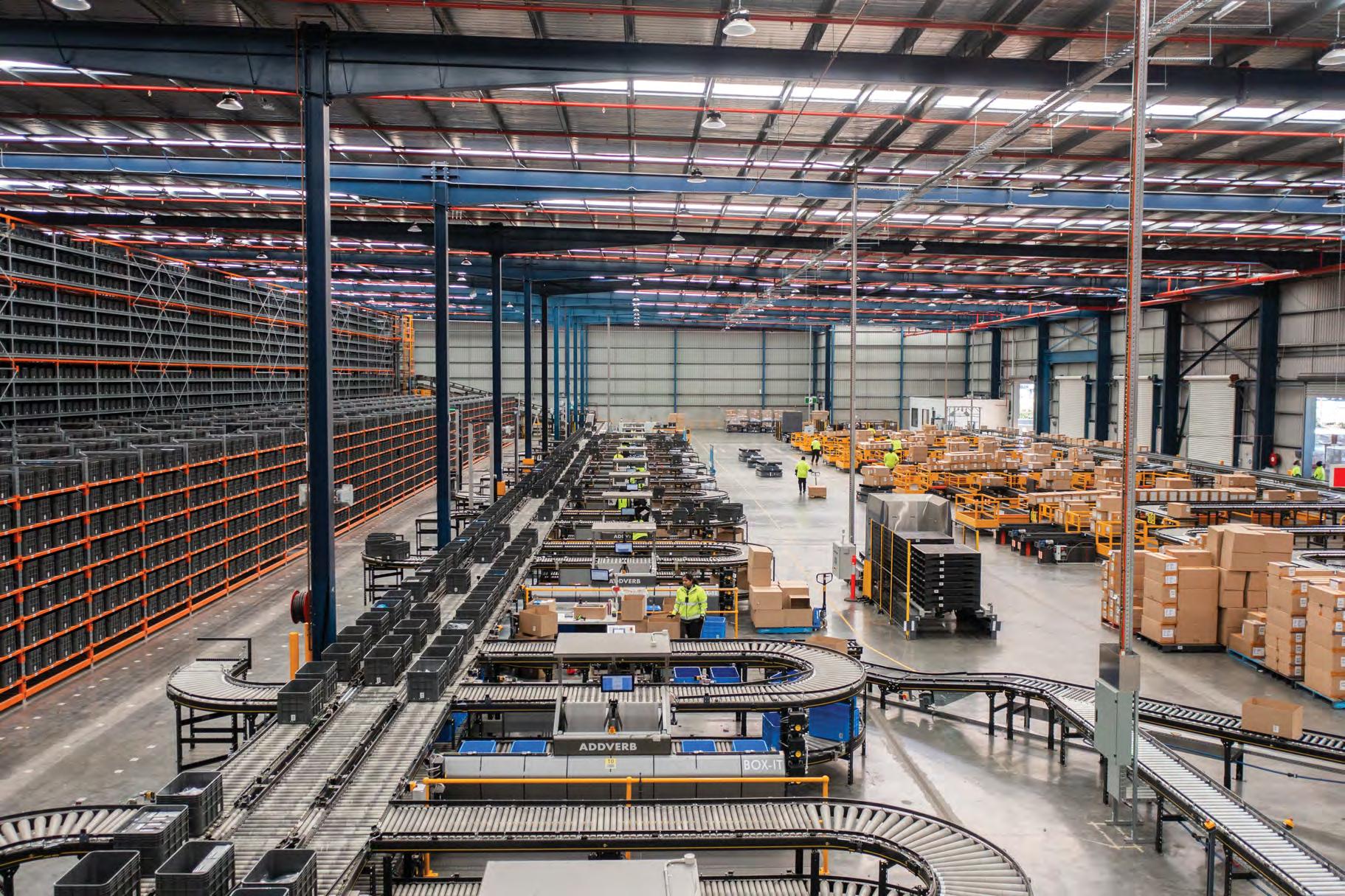
















New IVECO T-Way: high productivity and safety on off-road terrains




With a complete line-up of AWD and PWD versions and the the 16-speed HI-TRONIX automated gearbox, the IVECO T-Way features a host of functionalities such as Rocking Mode, Off-road Mode, Creeping Mode and 4 reverse gears to tackle with ease the toughest off-road conditions. The new architecture of the EBS system, combined with disc brakes on all wheels, greatly improves the vehicle’s performance and the driver’s safety in the most demanding applications.
New IVECO S-Way: high technology and efficiency for on-road missions
The new IVECO S-Way, with a completely redesigned and reinforced cab, offers a wide choice of Euro III/V diesel engines, a delivering class-leading power from 360 HP to 560 HP Euro III / 570 HP Euro V and superior fuel-saving devices, such as anti-idling feature, Ecoswitch, Ecoroll and Smart Alternator, 12-speed HI-TRONIX automated transmission with the most advanced technology in its category, electronic clutch and best-in-class torque-to-weight ratio.






At Almajdouie Logistics, our dedicated team provides tailored solutions that prioritize safety, drawing on our extensive industry experience.
With a commitment to excellence and customer satisfaction, our innovative services are designed to meet clients' unique needs. This dedication to exceeding expectations has earned us their continued trust.
Our organization specializes in delivering comprehensive solutions for mega projects across Saudi Arabia, the Middle East, and the Far East. With a strong commitment to sustainability, we actively participate in national renewable energy initiatives.



SIGNATURE MEDIA FZ LLE
P. O. Box 49784, Dubai, UAE
Tel: 04 3795678
Email: info@signaturemediame.com
Exclusive Sales Agent
Signature Media LLC
P.O. Box 49784, Dubai, UAE
Publisher: Jason Verhoven jason@signaturemediame.com
Editor: Malcolm Dias malcolm@signaturemediame.com
Art Director: Johnson Machado johnson@signaturemediame.com
Production Manager: Roy Varghese roy@signaturemediame.com

In its most simplistic definition, Robotics is a field of science working with machines that perform tasks based on predetermined and adaptive programmes and algorithms in an automatic or semi-automatic way. Robotics is a comprehensive concept that includes the building, planning and programming of robots.
On the other hand, Automation is a much broader concept than robotics. It means that specific parts of a process or an entire process are performed without human intervention. Instead, the process is operated only by predefined or adaptive computer applications and electrical or mechanical machines.
Robotics goes in tandem with automation, as in most cases robots are part of an automated system. This was amply demonstrated at the recently concluded three-day Seamless Middle East 2024 held at Dubai World Trade Centre from 14 to 16 May.
It is with this perspective that Savoye, the France headquartered international supply chain specialist, is our Cover Story for this current June 2024 Edition of Global Supply Chain. We speak to Alain Kaddoum Director, Savoye Middle East, in an exclusive and expansive interview.
As a specialist publication, Supply Chain operations are always under the scanner, and we recently engaged with Bonn, Germany-based Hendrik Venter, CEO Europe Middle East & Africa, DHL Supply Chain, for the lowdown in this arena.
Printed and Distributed by Masar Printing and Publishing L.L.C., Part of Dubai Media Incorporated Dubai, UAE
Contributor’s opinions do not necessarily reflect those of the publisher or editor and while every precaution has been taken to ensure that the information contained in this magazine is accurate and timely, no liability is accepted by them for errors or omissions, however caused. Articles and information contained in this publication are the copyright of Signature Media FZ LLE & SIGNATURE MEDIA LLC and cannot be reproduced in any form without written permission.
DP World has been making rapid strides and expanding in many parts of the world. We carry a report on DP World’s Euro 130 million expansion into Romania (the Black Sea port of Constanta). Separately and maritimerelated, we report on Noatum, an Abu Dhabi Ports Group company, recently announcing the launch of its Maritime’s office in Türkiye.
Elsewhere, we also had the opportunity to talk to Mumbai-India based Kami Viswanathan President, FedEx Express, Middle East, Indian Subcontinent and Africa (MEISA), for insights into the operations of this multinational company in the region.
In this edition, we have covered a diverse range of topics and covered as many companies as we possibly could. More and more logistics and supply chain companies have been gravitating into the Middle East and we wanted to democratize our coverage.
Add to this our regular repertoire of the latest news, topical features, profiles, business analyses, commentaries, professional contributions, Opinion-Editorials (OpEds), and useful content all of which are well encapsulated and meticulously curated to make for stimulating reading!
Happy productive and informative reading!
Malcolm Dias Editor, Global Supply Chainmalcolm@signaturemediame.com
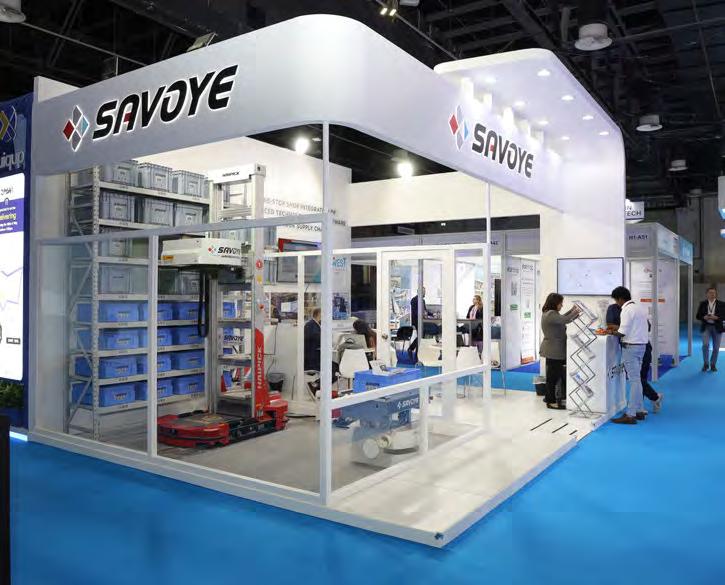
Port Operator makes big investment in Romania.
Exclusive interview with Kami Vishwanathan, FedEx.
Eelco Dijkstra reports on DWC Expansion plans.
ADPG to invest in Angolan Port.
QFZ and FedEx ink MoU.
Interview with Hendrik Venter, CEO,
The lowdown with Rohan Singhvi, Head of Logistics & Warehousing, RAK Ceramics.
Al Habtoor Motors acquires JAC dealership.
IVECO wins Theeb sales contract in KSA.
Inks partnership with Saudia Technic.









“Today, Savoye stands at the forefront of the regional industry, with exceptional pricing power and profit rates. Meanwhile, we remain resilient as ever, in our efforts to meet client expectations by innovating cutting-edge solutions,” avers Alain Kaddoum, Managing Director, Savoye Middle East, in an exclusive and expansive interview for our lead, Cover Story with Global Supply Chain.
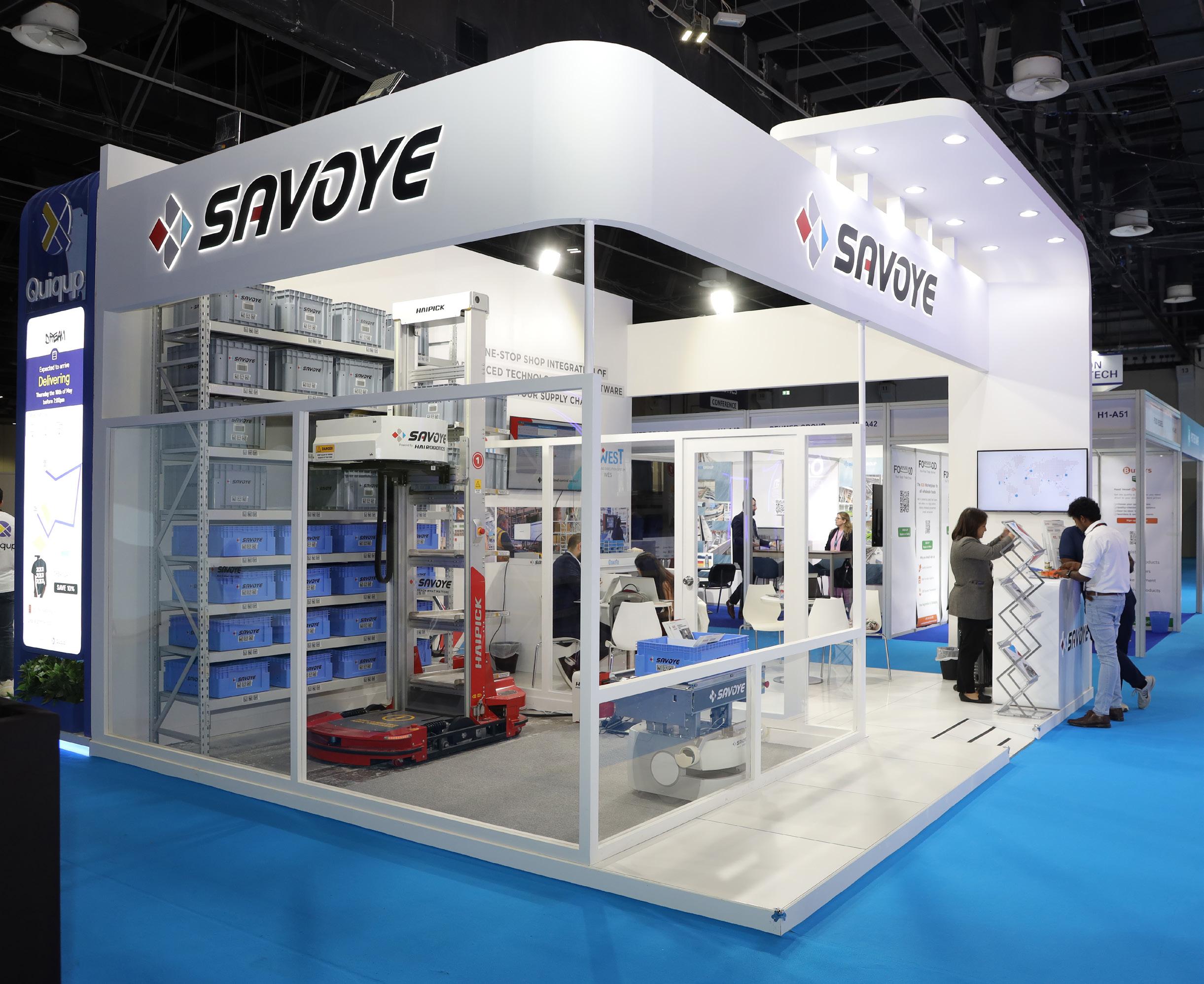
“We successfully launched our latest software platform ODATiO 3MS in the Middle East, which is anticipated to transform the supply chain landscape by synergising the capabilities of WMS, OMS and TMS.”ALAIN KADDOUM, Managing Director, Savoye Middle East
Over the years, following its entry in the region, Savoye Middle East has garnered global acclaim as an expert in the design and integration of automated and robotic intralogistics systems, and as an innovative publisher of Supply Chain Execution software solutions.
By synergising its hardware, software and custom-built capabilities, as a one-stop shop integrator, Savoye serves clients across 40-plus countries, facilitating manual, semi-mechanised, mechanised, highly automated and robotised solutions for supply chain.
In 2021, Savoye with a glorious 45-year legacy in the world of logistics, forayed and marked its presence into the UAE market, with an aim to tailor bespoke solutions for its supply chain and logistics clients in the region. The company revolutionised the regional supply chain landscape through its advanced set of software, automation and robotics solutions as well as by introducing ODATiO, an end-to-end modular solution equipped with 3MS capabilities of warehouse management, order management and transport management systems.
Savoye continued its growth and innovation journey by introducing earlier this year KWEST solution, a specialized and data-driven execution software to manage advanced warehouse automation solutions.
The following are the responses and transcripts of the one-on-one interview with Alain Kaddoum, Savoye’s top official and key spokesperson for the Middle East region.
GSC: As a leading brand with a now consolidated presence in the Middle East, comment on Savoye’s regional performance over the past three years, under your leadership? How was the company’s performance in 2023 and what are your expectations as you step into the second half of 2024?

Alain Kaddoum (AK): The past three years have proved remarkable for Savoye in terms of growth, innovation and profitability. By introducing a range of innovative offerings and rapid expansion across key trade hubs, we have positioned ourselves for longlasting success in the region.
Led by an unwavering commitment to excellence, we have succeeded in retaining our position as the leading provider of advanced technology solutions for the logistics industry in the region. We partnered with several companies such as Incube, ILA, HAI Robotics that helped further to strengthen our position in the market.
Last year, we commenced our strategic expansion in KSA by forming a partnership with CJ Logistics, iHerb’s 3PL provider, to deliver world-class automation solutions for the eCommerce giant’s Global Distribution Centre in Riyadh.
Within the UAE, we collaborated with New East General Trading, a leading automotive parts distributor in the region. As a part of the agreement, we are currently equipping their Dubai Distributions Centre
with cutting-edge Autonomous Case Handling Robot (ACR) solutions, the firstof-its-kind to be utilised in the Middle East. The autonomous system will be managed by Savoye’s WES, ensuring that the robotic solution we are implementing seamlessly aligns with customer processes.
We also successfully launched our latest software platform ODATiO 3MS in the Middle East, which is anticipated to transform the supply chain landscape by synergising the capabilities of WMS, OMS and TMS.
Launched earlier this year in the Middle East, KWEST, our innovative Warehouse Execution System (WES) harnesses three decades of expertise in automation and advanced data algorithms to coordinate automated systems. Furthermore, Savoye garnered several prestigious accolades
and awards in 2023/early 2024, marking a significant achievement in our journey.
We had a great start to 2024, with the introduction of innovative strategies aimed at broadening Savoye’s portfolio and consolidating our presence across the Middle East as one-stop shop integrator of advanced software and advanced automation. We look forward to securing new partnerships this year, while actively engaging in industry events to showcase our expertise and raise awareness on the importance of new technologies in the logistics industry.
GSC: As a leader in the regional robotics and software segment, what would you say are Savoye’s unique strengths? What is Savoye’s most in demand cutting-edge proprietary solutions?
“We have an exceptional track record of improving fulfilment efficiency by 30 per cent, reducing errors by 15 per cent and enhancing overall quality by leveraging the ODATiO software.”

AK: There are many factors that set us apart from the rest, like Savoye’s ability to cater to unique customer demands using modular software and robotic solutions. We have an exceptional track record of improving fulfilment efficiency by 40 per cent, reducing handling errors to nearly 0 per cent and enhancing overall quality of warehouse operations by leveraging on both ODATiO 3MS software and our highly ergonomic and high-speed Goods-ToPerson automated solutions.
As Savoye’s premier software solution, ODATiO is natively built to manage manual warehouses with a unique capability to integrate automation technology, allowing companies to grow with Savoye starting with Software application and gradually evolve by adopting advanced automated and robotic solutions.
After several years of development we launched this year our state-of-the-art, datadriven KWEST WES which is based on nano services technology allowing us to easily integrate Savoye’s automation but also 3rd party equipment. With KWEST, Savoye position itself as a leading and real one-stop-shop integrator of advanced solutions giving its customers access to best in-class technology without being limited to the equipment produced by our factories only. Savoye aims to revolutionise the entire intralogistics sector by enabling a new area of limitless and customercentric solution approach.
GSC: How does Savoye stay ahead in an ever-evolving regional landscape and what are the most pressing demands of the industry?
AK: Within MENA’s regional landscape, the demand for sustainable products continues to rise, making it imperative for logistics players to adopt sustainable practices. Regulatory measures have mandated a reduction in transport emissions across major markets, pushing businesses to curb carbon emissions. This aligns with the Paris Accord of 1990, which urges companies to cut down carbon emissions by 55 per cent by 2030.
Savoye has reaffirmed its commitment to sustainability by adopting green logistics measures such as the implementation of smart order pre-cubing feature in our ODATiO WMS to optimize the packages sizes and also state-of-art packaging lines, which

“Savoye has reaffirmed its commitment to sustainability by the implementation of the latestgeneration WMS, and packaging lines, which combine PAC 600 case former and Savoye’s Jivaro automatic high reduction and closing machine.”
combine PAC 600 case erector and Savoye’s Jivaro automatic high reduction and closing machine. These methods have helped to reduce carbon emissions by 140 metric tons each year by allowing our customers to maximize the delivery trucks occupancy and save on their last-mile and transportation.
GSC: In the present scenario, how critical is automation for the logistics industry in the Middle East? What are the emerging technological trends shaping the regional industry?
AK: The burgeoning eCommerce market and infrastructure development have fuelled the demand for increased efficiency and cost reduction, both of which can be achieved through automation.
Within the logistics landscape, automation can fulfil the dual purpose of streamlining operations and optimising supply chain management to cater to evolving customer demands. We have also seen in the past years constant shortage in manpower in
our region for which automation can be the answer for the companies struggling to get access to available and affordable skilled warehouse operators.
In terms of technology, the logistics sector is set to be an increasingly demanding industry for cutting-edge applications in areas such as robotics for warehouse operations, autonomous vehicles for delivery, IoT sensors for real-time tracking, AI for predictive analytics and blockchain for secure supply chain transactions.
A few key trends poised to play a pivotal role in transforming the industry in the coming years are autonomous systems, Internet of Things (IoT) platforms, automated trucks and drones as well as predictive software applications that support sustainable methods and optimize in real-time overall supply chain operations.
GSC: As MENA’s logistics landscape grows even more crowded, what opportunities and challenges await Savoye?
AK: At Savoye, we are committed to uncovering opportunities amid challenges and aim to leverage our team’s robust expertise in automation to sustain our success. We will be expanding our service portfolio to cater to emerging customer demands while navigating challenges posed by peer competition and nuanced regulatory frameworks. Savoye will harness its strategic expertise to overcome imminent challenges and strengthen its position as a trusted logistics partner and technology provider transforming the regional landscape.
GSC: In November 2023, Savoye ME acquired a major contract in the Kingdom of Saudi Arabia to support CJ Logistics and iHerb. Please tell us more about this seminal contract and Savoye’s expansion into KSA.
AK: As I briefly mentioned before, in 2023, we announced our partnership with CJ Logistics, which is the 3PL provider of iHerb, the leading health and wellness eCommerce player in KSA.
The agreement gave us the opportunity to deliver world-class automation solutions for iHerb’s Global Distribution Centre (GDC)
in Riyadh. As a global eCommerce leader, iHerb’s goal was to enhance its regional distribution network to fulfil growing local demands, aligning with the Health Sector Transformation Program, which falls under KSA’s ambitious Vision 2030.
This partnership enables CJ Logistics to utilise our cutting-edge automation solutions to optimise operations and boost productivity, ultimately fulfilling the goals set by iHerb.
As a part of this collaboration, we have developed a first-of-its-kind automated fulfilment centre with an X-PTS Goods-ToPersons (GTP) shuttle system, Warehouse Execution Software (WES), Zone to Zone fast picking system and an Automated Orders Packing system, which can process up to 15,000 orders per day.
Savoye’s advanced offerings, such as the ergonomic GTP station, help reduce picking and packing times, while our best-in-class packing lines close and label prepared orders and automatically dispatch them into shipping lanes.
GSC: Savoye ME participated in the recently concluded Seamless Middle East
2024; what was showcased at the event and what was the message conveyed?
AK: We always look forward to participating in leading events like Seamless, GITEX and Saudi Smart Logistics among others. At Seamless Middle East 2024, we were able to highlight Savoye’s commitment to innovation and operational excellence in logistics, by showcasing our cutting-edge Autonomous Case Handling Robots (ACR) and a demo version of our proprietary software ODATiO.
The message we emphasised was the transformative potential of technology in bolstering warehouse operations, enhancing efficiency and fulfilling the evolving demands of the regional market. Moreover, we highlighted our leading position as one-stop shop integrator of turnkey solutions and our relentless dedication to providing seamless solutions, while pioneering technological advancements to facilitate client success.
As the icing on the cake, we’re delighted to have been chosen during Seamless by an e-commerce player for a small-scale project comprising a semi-automated order fulfillment solution. Sometimes, simplicity can be the answer! With our solution based

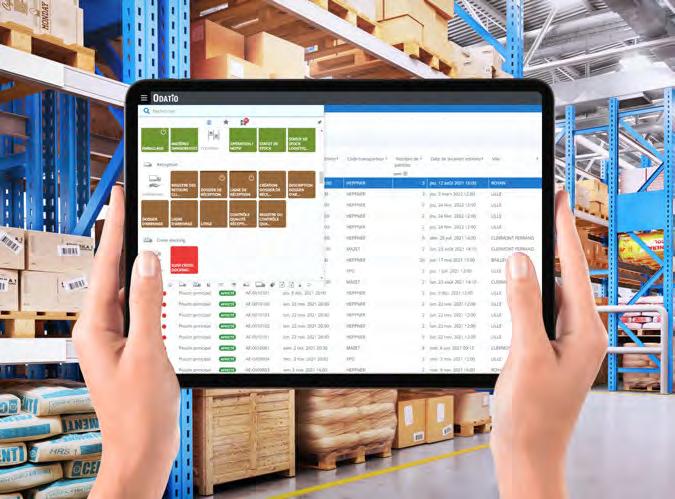
“We have already enhanced our Autonomous Mobile Robots (AMRs) offerings, we aim to step up our R&D activities to improve AI capabilities. ”
on dynamic shelving and conveyors, we were able to meet the customer’s need to significantly improve his order fulfillment process with limited CAPEX. Here again, we demonstrate our dedication to being a trusted partner for our customers at every level, whether for simple or more sophisticated solutions.
GSC: What is the role of technology in the logistics industry and how does Savoye stay at the forefront of innovation within the industry?
AK: In recent years, technology has emerged as the linchpin of seamless logistics operations, due to its vital role in enhancing efficiency and reliability. Within MENA’s dynamic logistics landscape, logistics providers can stay ahead of the curve by embracing advanced technologies. Through robust investments in innovation, research and development (R&D), we have been able to bolster our technological capabilities. By adopting
advanced automation solutions, robotics, AI-driven analytics and blockchain, we optimise operations, enhance accuracy and improve customer satisfaction.
In addition, we have forged strategic partnerships with leading tech players, facilitating access to cutting-edge advancements that consolidate our role as a pioneer in the industry.
GSC: What are Savoye’s expansion plans in the region for the foreseeable future?
AK: Now that we have successfully completed our expansion into the KSA market, we are considering strategic expansion across other GCC countries to fulfil the rising technology and AI demands across the Middle East.
While we have already enhanced our Autonomous Mobile Robots (AMRs) offerings, we aim to step up our R&D activities to improve AI capabilities. Furthermore, we will be continuing to build up a strong regional customer service
team and strengthening our services to provide our local customers with a premium offering tailored to their lifecycle.
GSC: According to you, what is Savoye’s growth potential in the MENA region?
AK: The Middle East’s eCommerce landscape is currently evolving and undergoing an unprecedented expansion due to growing internet penetration, rising disposable income and evolving consumer preferences. Infrastructure investment in the region is rising, leading to improved connectivity, further enhancing the region’s stature as a lucrative logistics hub.
According to data from market business analysts, the MENA warehouse automation market is expected to reach USD 1.6B by 2026.
This presents remarkable growth opportunities for Savoye, particularly, as the Middle East diversifies its economy fuelling the development of digital renewable energy, tourism and manufacturing sectors. Savoye aims to leverage these opportunities, remaining steadfast in its commitment to tailoring bespoke advanced logistics solutions, and consolidating its position as a trusted technology partner.




Etihad Cargo has announced its complete readiness for the UAE PreLoading Advance Cargo Information (PLACI) regulations, ensuring that partners and customers will experience no disruptions in their shipments. This achievement underscores the carrier’s commitment to maintaining the highest standards of security and efficiency in operations.
PLACI is an advanced security measure designed to enhance the monitoring and safety of air cargo. It mandates the submission of cargo data to regulatory authorities for risk assessment prior to loading, thereby enhancing the security of the supply chain.
This protocol is crucial for addressing potential threats early and supporting the seamless flow of commerce by ensuring that all cargo is risk-assessed before it is loaded onto an aircraft.
Since its introduction, the adoption of PLACI has gradually expanded. Initially implemented by the US Customs & Border Protection with the Air Cargo Advance Screening (ACAS) programme in 2019, it was later adopted by the European Union with the launch of the Import Control System 2 (ICS2) in 2023. Both ACAS and ICS2 are fully integrated into Etihad Cargo’s operational processes, and Etihad Cargo was one of the first carriers to start live filing to ACAS.
The UAE’s National Advance Information Centre (NAIC), under the Federal Authority for Identity, Citizenship, Customs & Port Security, is the first country outside of North America and Europe to implement a PLACI regime.
Additional countries are planning to roll out PLACI, indicating a growing global commitment to bolstering the security of the air cargo supply chain against evolving threats.

As the national carrier of the UAE, Etihad Cargo is fully committed to the successful implementation of the UAE’s PLACI initiative and has integrated UAE PLACI standards into its global operations.
“The early and comprehensive adoption of UAE PLACI protocols demonstrates Etihad Cargo’s dedication to security and a proactive approach to regulatory compliance,” commented Stanislas Brun, Vice President Cargo at Etihad Cargo.
“Etihad Cargo has been collaborating closely with NAIC and is one of the four carriers that participated in the PLACI pilot. Etihad Cargo has played an important role in the success of the UAE-PLACI as the result of the tremendous cooperation and efforts made by the Etihad Cargo team, which helped us to develop a visible cutover plan for the UAE-PLACI that has already been accomplished,” observed Mubarak Alghafli, Executive Director, NAIC.
Etihad Cargo will continue to work closely with international and local authorities to navigate these new regulations effectively. The carrier is also committed to assisting partners and customers in understanding and adapting to these changes, ensuring that all stakeholders are informed and prepared.
This initiative is part of Etihad Cargo’s ongoing efforts to enhance security protocols and streamline operations, maintaining its status as the air cargo partner of choice, a press communique concluded.
Center logistics and warehouse you?
What is data-driven logistics and how does it stabilize the warehouse automation operation for you?

What is data-driven logistics and how does it stabilize the warehouse automation operation for you?
What is data-driven logistics and how does it stabilize the warehouse automation operation for you?
What is data-driven logistics and how does it stabilize the warehouse automation operation for you?
just a hypothetical scenario— involves using data and the supply chain, including and warehouse operations.
With the WAMAS Control Center, this isn’t just a hypothetical scenario— it’s a real possibility. Data-driven logistics involves using data and analytics to optimize various aspects of the supply chain, including inventory management, transportation, and warehouse operations.
Benefits at a Glance can warehouse into a reliability.
With the WAMAS Control Center, this isn’t just a hypothetical scenario— it’s a real possibility. Data-driven logistics involves using data and analytics to optimize various aspects of the supply chain, including inventory management, transportation, and warehouse operations.
With the WAMAS Control Center, this isn’t just a hypothetical scenario— it’s a real possibility. Data-driven logistics involves using data and analytics to optimize various aspects of the supply chain, including inventory management, transportation, and warehouse operations.
Benefits at a Glance
With the WAMAS Control Center, this isn’t just a hypothetical scenario— it’s a real possibility. Data-driven logistics involves using data and analytics to optimize various aspects of the supply chain, including inventory management, transportation, and warehouse operations.
industries from fashion warehouses with actionable operations, improve efficiency, thereby stabilizing
Tailored to meet the specific demands of industries from fashion to pharmaceuticals, WAMAS provides warehouses with actionable insights that enable you to optimize operations, improve efficiency, and adapt to changing market conditions, thereby stabilizing warehouse automation operations.
Receive proactive notifications for faults and maintenance, boosting operational efficiency.
Tailored to meet the specific demands of industries from fashion to pharmaceuticals, WAMAS provides warehouses with actionable insights that enable you to optimize operations, improve efficiency, and adapt to changing market conditions, thereby stabilizing warehouse automation operations.
Tailored to meet the specific demands of industries from fashion to pharmaceuticals, WAMAS provides warehouses with actionable insights that enable you to optimize operations, improve efficiency, and adapt to changing market conditions, thereby stabilizing warehouse automation operations.
Tailored to meet the specific demands of industries from fashion to pharmaceuticals, WAMAS provides warehouses with actionable insights that enable you to optimize operations, improve efficiency, and adapt to changing market conditions, thereby stabilizing warehouse automation operations.
Customize dashboards to turn complex data into clear, actionable insights.
Discover how WAMAS can transform your warehouse into a model of efficiency and reliability.
Discover how WAMAS can transform your warehouse into a model of efficiency and reliability.
Discover how WAMAS can transform your warehouse into a model of efficiency and reliability.
how WAMAS can transform your warehouse into a model of efficiency and reliability.
Drive maximum efficiency and cost savings, leading to unmatched customer satisfaction.
+971 4 804 8100 | ssi-schaefer.com
+971 4 804 8100 | ssi-schaefer.com
Benefits at a Glance
Benefits at a Glance
Benefits at a Glance
Receive proactive notifications for faults and maintenance, boosting operational efficiency.
Receive proactive notifications for faults and maintenance, boosting operational efficiency.
Receive proactive notifications for faults and maintenance, boosting operational efficiency.
Receive proactive notifications for faults and maintenance, boosting operational efficiency.
Customize dashboards to turn complex data into clear, actionable insights. Drive maximum efficiency and cost savings, leading to unmatched customer satisfaction.
Dubai Logistics City, Plot WB54 Dubai South, United Arab Emirates +971 4 804 8100 | ssi-schaefer.com
Customize dashboards to turn complex data into clear, actionable insights.
Customize dashboards to turn complex data into clear, actionable insights.
Customize dashboards to turn complex data into clear, actionable insights.
Drive maximum efficiency and cost savings, leading to unmatched customer satisfaction.
Drive maximum efficiency and cost savings, leading to unmatched customer satisfaction.
Drive maximum efficiency and cost savings, leading to unmatched customer satisfaction.
The region’s strategic location positions it perfectly as a global logistics hub
DHL Supply Chain is well entrenched in the EMEA region and currently has operations spanning 21 facilities, more than 225 vehicles in its fleet, two main connected control towers and providing full end-to-end logistic solutions across the Middle East.
Bonn, Germany-headquartered DHL Supply Chain is a part of the DHL Group. DHL Supply Chain is the world’s largest contract logistics specialist offering warehousing, transportation, fulfilment and multi-valueadded services such as packaging, returns, MRO (maintenance-repair-overhaul), across a variety of sectors including but not limited to energy, chemicals, automotive, health care & life sciences, retail, ecommerce and technology.
The logistics services providing Company is actively looking at ways in which it can grow its presence here and become a trusted partner for more companies as they look to optimize their supply chain.
Global Supply Chain conducted an exclusive and extensive interview with Hendrik Venter, CEO Europe Middle East & Africa, DHL Supply Chain, on a broad range of issues ranging from the company’s role in the supply chain domain, its Middle East focus, challenges, competition, future strategies and more. The following are the transcripts of that exchange.
Global Supply Chain (GSC): How significant are the Kingdom of Saudi Arabia and UAE for your Middle East operations?
Hendrik Venter (HV): The Kingdom of Saudi Arabia (KSA) and the United Arab Emirates (UAE) hold great significance for DHL’s Middle East operations. The strategic geographical locations position the region perfectly as a global logistics
hub due to their proximity to major global markets and well-developed transportation infrastructure.
Both countries have robust economies, featuring sectors such as oil and gas, manufacturing, construction, retail, and e-commerce. These economic activities generate substantial logistics and supply chain demands, making DHL Supply Chain’s services vital in facilitating trade and supporting businesses in these regions.
Moreover, the growing e-commerce sector in KSA and UAE, driven by increasing internet penetration and a young population, further enhances the importance of DHL’s extensive logistics network and expertise in serving the expanding e-commerce market.
KSA and UAE have also made significant investments in logistics infrastructure, including airports, seaports, and logistics parks. This infrastructure supports efficient transportation and distribution networks, enabling DHL to offer a wide range of logistics services, such as air freight, ocean freight, road transportation, and warehousing.
Additionally, both countries have established free trade zones that attract multinational companies and facilitate trade. DHL plays a crucial role in supporting the trade flows and providing logistics solutions to businesses operating in these zones. As a result, DHL continues to invest in expanding its presence and capabilities in KSA and UAE to meet the growing demands of businesses and consumers in the region.
Chief Executive Officer-Europe, Middle East and Africa
DHL Supply Chain
In his current position, Hendrik Venter heads 22 country markets for the company and serves as a member of DHL Supply Chain’s Global Management Board.
Hendrik has held various management positions at DHL Supply Chain since 2009, initially worked in South Africa as Director Healthcare, Technology & Automotive and, from 2013 onwards, headed DHL’s contract logistics business in Poland as Managing Director. In 2015, he was appointed CEO Central Europe until his area of responsibility was expanded soon afterwards to include the Eastern Europe region.
Since 2019, Venter has been managing the DHL Supply Chain EMEA region. Venter, lives in Bonn, Germany with his wife and holds a Bachelor of Science in Engineering and an Honours Degree in Business Management.


GSC: What are the challenges and opportunities for DHL Supply Chain EMEA going forward?
HV: The Middle East is emerging as a major player in the global supply chain and logistics industry. Its geographical advantage is undeniable, positioned at a critical juncture for trade routes between Asia, Europe, and Africa.
Several countries in the region are also undergoing economic diversification and ramping up local manufacturing, further fueling the demand for efficient logistics. Governments are actively investing in infrastructure like ports, airports, and economic zones to improve connectivity, and businesses are embracing technological advancements to optimize their supply chains.
Despite these strengths, challenges remain. The region relies on foreign expertise in some areas of logistics, and for many companies it can be hard navigating
many companies it can be hard navigating the different regulations of the countries across the region.
However, the region is already on the right path and with continued investment in infrastructure, technology, and workforce development, the Middle East has the potential to become a true leader in the global supply chain landscape.
This is why having a strategic contract logistics partner like DHL Supply Chain is critical. We can use our established global network and local expertise to help companies navigate the complexities of moving their inventory across these geographies.
Our multimodal transportation services, control towers, strategically placed warehousing facilities and expertise in developing and deploying technological advancements like automation, data analytics, and AI-powered solutions are key differentiators in taking advantage of the opportunities in the market but also overcoming the challenges as the logistics industry grows in the Middle East.
GSC: What are the DHL Supply Chain strengths and capabilities that give you the competitive edge?
HV: DHL Supply Chain is well-positioned to address the challenges in the Middle East’s supply chain industry thanks to our professionalism and multi-faceted
attributes. These include:
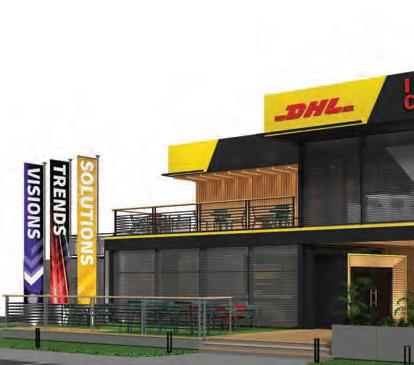

Proven track record: DHL already has a strong presence in the Middle East, particularly in key sectors like energy and healthcare, which translates to experience with regional intricacies
Global expertise: We can leverage our experience implementing successful supply chain solutions around the world and adapt them to the specific needs of the Middle East
Skilled workforce: With a large and experienced workforce in the region, DHL can provide the necessary on-the-ground expertise to navigate complex situations.
Focus on transformation: DHL Supply Chain is actively promoting advanced technologies and best practices to help businesses in the Middle East modernize their supply chains.
Reputation for excellence: DHL’s established reputation for operational excellence gives businesses confidence in their ability to improve supply chain
in their ability to improve supply chain efficiency.
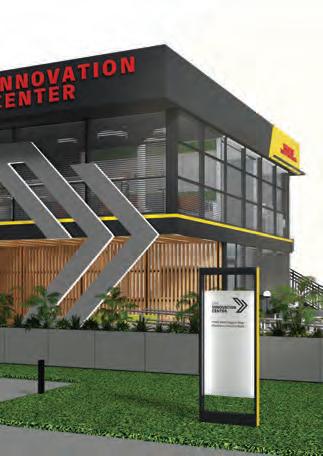
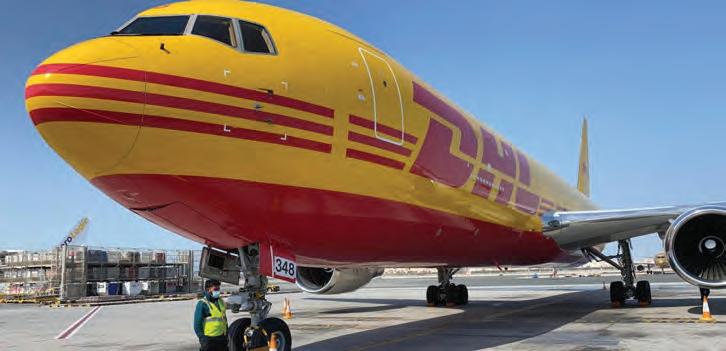
“Over 90% of our warehouses use a digital technology solution. Within the EMEA region to date over 350 facilities are equipped with digital technologies equating to 6700 various devices deployed and over 300 customers impacted. ”
GSC: How important are technology and AI for your sector, and what trends do you see presently?
HV: DHL Supply Chain has been on the forefront of digitalization with over 90% of our global network of warehouses using a digital technology solution. Within the EMEA region to date over 350 facilities are equipped with digital technologies equating to 6700 various devices deployed and over 300 customers impacted. This achievement is thanks to our ‘Accelerated Digitalization’ strategy that has been a guiding light on how we develop, deploy and continuously improve technology.
There are a few trends that are emerging such as the use of robotics to address labor challenges, AI and data analytics to help with inventory management and route optimization as well as orchestration to create a central nervous system for operations, optimizing resource allocation, automating workflows, and dynamically adapting to real-time changes in demand. DHL Supply Chain is already at the forefront of these trends.
We have a fleet of over 7000 robots globally that completes repetitive tasks such as unloading containers, moving
inventory and fulfilling orders. We are currently piloting Gen AI to rapidly develop system interfaces and data products and simultaneously rolling out intelligent optimization algorithms that streamline warehouse tasks.
GSC: What are your expansion plans for the region?
HV: DHL Supply Chain is excited about the opportunities for business in the Middle East. Our most recent announcement is the joint venture between, DHL and Saudi Aramco. Advanced Supply Chain Management Operations (ASMO) is meant to become the new logistics and procurement hub – mainly for companies in the energy, chemicals and heavy industries – in Saudi Arabia.
The joint venture is the first hub in the region that offers a comprehensive, integrated end-to-end supply chain service and will procure, store and transport goods, replacement parts and technical equipment from Saudi Arabia and the entire MENA region.
Beyond that we are continuously looking at ways in which we can expand our network in the region and offer our
expertise to companies who are keen on having a partner that can evolve their supply chain strategy to meet today’s challenges.
GSC: How is the exponential boom in e-commerce changing the landscape, equations, and scope of your Supply Chain operations?
HV: E-Commerce has been a growth sector for DHL Supply Chain and our business is well positioned to respond to the needs of ecommerce and drive its growth.
The biggest impact has been the increase in volumes and the complexity of logistics operations which has resulted in demand for warehousing, fulfillment, and distribution services. Thanks to our already strong network of facilities our customers can tap into warehouses that are close to their endusers, helping to improve delivery speeds.
We are also optimizing our fulfillment center operations with advanced automation technologies, such as robotics and automated picking systems, to improve efficiency and order accuracy. Technology and specifically data analytics is also being used to make inventory management more intelligent, such as predicting demand.
Finally, we have also seen the need for more value-added services such as product customization, kitting, or packaging. Many of our customers understand the advantage of using DHL Supply Chain to provide endto-end solutions versus moving inventory across multiple vendors to create a finished product for delivery.

Rohan Singhvi, Head of Logistics and Warehousing, RAK Ceramics, explains and demystifies the complexities and intricacies of demand planning, in this special contribution (in Q&A format) to Global Supply Chain.
What is demand planning, and why is it important for businesses?
Demand planning is a tool to forecast demand for a particular product or service, to achieve high fill rates, maintain optimum stock levels and to keep up with high customer service levels.
Keeping pace with the demand for a product is critical, because failing to do so can result in lost revenue for the product or, even worse, lost customers. One the main goals of demand planning is to have just the right amount of inventory to meet customer demand without incurring shortages or wasting money on making and storing surplus inventory.
How do you forecast demand accurately in a dynamic market?
There are four ways to forecast demand
accurately in dynamic market:
Enhanced data collection & Integration: Data collection is the backbone of any demand forecasting. This can be done by implementing integrated data management systems / IOT, which can help break down silos and ensure that all relevant data is captured and shared across departments.
Incorporate Advance Analytics & AI:
Advanced analytics and AI technologies can help companies better understand complex demand patterns and predict future trends more accurately.
Flexibility and Scenario Planning: Building flexibility into the forecasting process and regularly conducting scenario planning can prepare companies for unexpected changes in demand.
Continuous Monitoring and Adjustment:
Demand forecasting should be a continuous process that regularly monitors actual demand versus forecasted demand. This will help companies to identify discrepancies and adjust their forecasts.
What are the key components of a demand planning process?
Demand planning is a complex process that typically includes the following elements:
• Data collection from external and internal sources on the factors known to predict or influence demand.
• Statistical analysis of inventory, sales.
• Modeling the data to predict future demand.
• Collaboration with stakeholders to gather information on events that could affect demand, such as promotions and production delays.
Explain the difference between shortterm and long-term demand planning?
Short term demand planning typically covers period of less than one year, usually up to three months. The main purpose of short-term forecasting is to support operational decisions, such as scheduling, staffing, replenishment, and allocation.
Short-term forecasts are usually more accurate and reliable than long-term forecasts, as they are based on recent and relevant data, and have less uncertainty and variability. Some common methods for short-term forecasting are regression analyses, exponential smoothing and time series analysis.
Long term demand planning typically covers a period of more than one year. The main purpose of long-term forecasting is to support strategic decisions such as market entry, capacity planning, investment and product development.
Long-term forecasts are usually less accurate and reliable than short-term forecasts, as they are based on historical and projected data, and have more uncertainty and variability. Some common methods for long-term forecasting are scenario analysis, trend analysis and simulation.
ROHAN SINGHVIHead of Logistics and Warehousing, RAK Ceramics
Rohan Singhvi has been in the Supply chain industry for the last 16 years and has been instrumental in leading change, automation and digital transformations across companies.
He has led five greenfield implementations and with his expertise, he transformed those warehouses in some of the leading fulfillment centers of UAE and India. Being part of the Solution design team at DHL Supply Chain India, he was leading the designing and successful implementation of warehousing and transportation solutions across Southeast Asia.
In UAE he has led supply chains for big companies like Emirates, dnata, RAK Ceramics and Al Maya group.


How do you handle seasonality and trends in demand forecasting?
There are three essential trigger points or factors such as Seasonality / Trends and Events influence demand forecasting. These factors can cause demand to fluctuate, spike, or drop unexpectedly making it hard to forecast.
Seasonality:
Seasonality is the pattern of demand that repeats itself over a certain period. Seasonality can be caused by natural factors, such as the change of seasons, or by human factors, such as holidays, festivals, or school terms.
To incorporate seasonality into your demand forecasting models, you need to identify the seasonal cycle and the seasonal factors that affect your demand. Trends:
Trends are the long-term changes in demand that reflect the overall direction of the market, the industry, or the society. Trends can be positive, negative, or neutral, and can be influenced by factors such as technology, innovation, demographics, or consumer behaviour.
To incorporate trends into your demand forecasting models, you need to analyze the historical data and identify the trend
components that affect your demand. You can use methods such as moving averages, exponential smoothing, or trend projections to extrapolate your demand forecasts based on the trend components.
Events:
Events are the short-term or one-time occurrences that impact the demand for a product or service, either positively or negatively. Examples of events include promotions, product launches, price changes, recalls, strikes, natural disasters, or pandemics.
To incorporate events into your demand forecasting models, you need to anticipate the occurrence and the impact of the events on your demand. You can use methods such as scenario analysis, causal analysis, or judgmental methods to adjust your demand forecasts for events.
What role does data analytics play in demand planning?
Data analytics plays the following major roles in demand planning-
• Uncovering Historical Patterns and Trends by analyzing large datasets containing historical sales, customer behavior, and external factors such as economic indicators.
• Identifying Seasonal Variations & Demand Cycles which are crucial for accurate forecasting.
• Predicating Customer Behaviour and Preferences that incorporate external factors such as economic conditions, competitor activities, weather patterns, and regulatory changes can significantly impact demand.
How do you integrate demand planning with supply chain management?
Integration of Demand planning with Supply chain management can be done through IBP (Integrated Business Planning) tools such as S&OP (Sales & Operations Planning) that act as strategic interface between the two elements of Sales and Operations.
The beauty of S&OP lies in its dual focus: while ‘sales’ is concerned with the demand side, examining market trends, customer behavior, and sales data, ‘operations’ is all about the supply side, which encompasses production capacities, logistics, inventory management, and resource allocation.
S&OP fosters communication and collaboration across the organization, driving improved efficiency, reduced costs, increased customer satisfaction, and better business performance.
What technologies or software tools are commonly used in demand planning? There are five major technologies or software tools that are used in Demand Planning:
1. Forecasting and Demand Planning Software.
2. Inventory Management Systems.
3. Data Analysis and Reporting Tools.
4. Collaboration and Communication Platforms.
5. ERP and Supply Chain Management Systems.
What are some familiar challenges faced in demand planning, and how do you overcome them?
Quality and availability of data: Good data is the backbone of any demand forecasting. But businesses often must deal with data that is missing, wrong, or out of date, which can make predictions that aren’t correct. This can be overcome by having data cleanup, by adding more data sources & using demand forecasting tools.
Variables from external factors: Demand estimation can be affected by things outside of the company, like the economy, what competitors do, and changes in what customers want. A lot of the time, traditional forecasting methods can’t take these changing factors into account, which makes their predictions wrong. This can be overcome by using advanced analytics, scenario planning and collaboration with experts in the field.
Changes in product’s lifecycle: As innovation speeds up, advanced product life cycles are getting shorter. Because of this, it’s hard to predict demand, especially for new goods that don’t have any historical data. This can be overcome by product analysis, pre-launch testing and evaluation once the product is released.
Keeping both accuracy and timeliness in mind: It is not always easy to balance the need for accurate predictions with the need to make them on time. Businesses need to find a balance between doing thorough, accurate demand forecasting, and giving quick and useful insights. To overcome this
business needs to use rolling forecasts and make short term predictions.
Alignment between departments and collaboration: Demand forecasting shouldn’t happen in a vacuum. When departments like marketing, sales, finance, and operations aren’t working together properly, it can cause problems with predictions and, in the end, the business plan. This can be overcome by setting up a way to forecast together with inputs from cross functional teams and use collaborative demand forecasting tools.
Can you discuss the importance of collaboration between different departments in demand planning?
Demand collaboration is a process where multiple stakeholders come together to provide input into the forecasting process. By establishing collaborative demand planning, companies can have a comprehensive view of inputs from various departments and supply chain partners which allows them to identify relevant changes and shocks more quickly.
By gathering information from all relevant parties, you can create a more comprehensive forecast that considers a broader range of factors and provides a clearer picture of future demand. This close collaboration enables teams to create better coordinated responses faster.
How do you measure the effectiveness of a demand planning strategy?
Effectively tracking key demand planning
metrics involves assessing forecast accuracy, fill rate, Inventory Turnover ratio, lead time variability, stock turnover, customer service levels, backorder rate, demand variability, on-time delivery performance, inventory turns, and stockout rate.
Regular monitoring of these metrics provides insights into demand precision, inventory efficiency, and overall supply chain reliability. Ongoing analysis allows for informed adjustments, optimizing demand planning strategies to enhance customer satisfaction and operational effectiveness.
Can you provide examples of successful demand planning strategies implemented by companies in different industries?
Amazon is a company that heavily relies on demand forecasting to manage its operations. The company uses algorithms and machine learning models to analyze customer data, sales history, and other relevant data to create accurate demand forecasts.
These forecasts help Amazon determine how much inventory to stock, where to store it, and how to distribute it efficiently. By using demand forecasting, Amazon has been able to reduce delivery times and improve customer satisfaction.
Ford Motor Company is another company that has successfully used demand forecasting to improve its operations. The company uses predictive analytics and machine learning to analyze historical sales data and make predictions about future demand. This allows Ford to adjust production levels to meet demand and optimize its supply chain.
Coca-Cola is a company that has been using demand forecasting for decades. The company uses a variety of methods, including statistical modeling and trend analysis, to create accurate demand forecasts.
Apple has the best demand forecasting tools to plan its supply of iPhones / iPads across the world. It does its demand planning by doing historical data analysis, market research, and using the existing supply chain data. They use Machine learning and AI to analyze large amounts of data and adjust forecasts in real-time based on changing market conditions.

DP World recently opened three major new sites in Romania, providing a significant boost to the country’s growing status as a key hub of European trade and enabling economic growth throughout the region.
Constanta, the largest container port on the Black Sea, is now home to two new facilities following a € 65mn investment: a 5-hectares ‘project’ cargo terminal for heavy, large and complex cargo, and a new ‘roll-on, roll-off’ (Ro-Ro) terminal that will handle up to 80,000 vehicles annually at its peak.
A further € 50mn will be invested in a new multi-transport platform in Constanta that will open in 2025. DP World’s third new facility opening today is in Aiud, in the industrial heartland of Romania, which is now home to a new 8-hectares ‘intermodal’ logistics hub connecting rail and road, following a € 21mn investment.
The new facilities will improve the connectivity between DP World’s existing sea, rail, barge and truck services across Romania and will enhance the movement of goods between mainland Europe through to the Black, North and Adriatic Seas. DP World has invested over € 250mn in Romania since 2004, including grants from the European Union.
The latest infrastructure projects were announced as DP World marks the 20th anniversary of its investment in Romania; the first European country in which it expanded. The business has since grown its operation considerably, contributing to the impressive growth of the port. During this 20-year period Romania has also developed rapidly and is now Eastern Europe’s second-largest
economy after Poland.
DP World anticipates that its latest investments will encourage and enable major businesses to relocate or expand manufacturing facilities in the region. This so-called ‘nearshoring’ and ‘reshoring’ has become increasingly prevalent in Europe in recent years, spurred in part by the rise in geopolitical tensions.
“DP World looks forward to building on our long-standing relationship with Romania, and to deploying our latest investments to support Romania as it plays an increasingly important role in trade and economic growth in the region,” commented Rashid Abdulla, CEO and Managing Director, DP World Europe, who started his career as Manager for Constanta in 2004.
“DP World’s latest investments in Romania will increase the cargo flows by around two million tonnes per annum through the country. We believe that with this investment, DP World in Constanta will significantly strengthen its position as one of the most important container and Ro-Ro hubs in Central and Eastern Europe,” remarked Cosmin Carstea, CEO, DP World Romania.
“Constanta port has opened Romania to new markets and trading opportunities, provided stable and skilled jobs and catalysed the development of a whole host of adjacent businesses,” noted Sorin Grindeanu, Minister of Transportation, Romania.


The company supports the surging e-commerce and trade demands of the MEISA region
This enormous investment reaffirms FedEx’s commitment to economic growth, aligned with the UAE’s ‘National Agenda for Non-oil Export Development’ which aims to grow the nation’s foreign trade.

The MEISA region is a priority market for FedEx. It is strategically located at the crossroads of major global trade routes connecting the East and the West, making it an essential multi-modal logistics hub for the world. FedEx is dedicated to investing in its infrastructure, networks, and solutions to foster socio-economic development, digital transformation, and innovation in the region,” affirmed Kami Viswanathan President, FedEx Express, Middle East, Indian Subcontinent and Africa (MEISA), in a recent exclusive and expansive interview with Global Supply Chain following her earlier visit to Dubai in February 2024 alongside
 KAMI VISWANATHAN President, FedEx Express, Middle East, Indian Subcontinent and Africa (MEISA).
KAMI VISWANATHAN President, FedEx Express, Middle East, Indian Subcontinent and Africa (MEISA).

the top international and regional corporate brass to inaugurate the gleaming FedEx Hub in Dubai’s DWC (Dubai World Central-Al Maktoum International Airport).
“Our focus includes unlocking growth opportunities for e-commerce businesses, supporting SME expansion to global markets, and enhancing market access through our global air and ground networks,” she continued.
In the first part of the wide-ranging interview, Kami Vishwanathan fielded business-related questions for FedEx’s growth trajectory in the region. In the second part she addressed issue-associated questions concerning sustainability, CSR and DEI (Diversity, Equity and inclusion).
Global Supply Chain (GSC): You were in Dubai in February 2024 alongside the FedEx top brass, to inaugurate the new FedEx DWC Hub. Briefly explain the reason for, and significance of, this development, and the impact it will have on your operations.
Kami Viswanathan (KV): FedEx has made a long-term investment of more than US$ 350mn (AED 1.3bn) into the UAE’s economy through infrastructure and technological advancements in this new hub at DWC. It also supports the growing e-commerce and
trade demands in the Middle East, Indian Subcontinent and Africa (MEISA) region and beyond.
Spanning more than 57,000sqm, the FedEx hub includes an automated sort system, currently capable of handling up to 9,000 packages per hour and equipped with a six-sided barcode reader and sorter. This sophisticated technology significantly enhances the efficiency, accuracy, and speed of package processing and distribution from the facility.
GSC: How significant is the MEISA region for global FedEx?
KV: The MEISA region accounts for approximately 45% of the world’s population and includes some of the world’s fastest-growing economies. Its significance lies in its potential for growth, strategic position in global trade, and increasing demand for logistics and transportation services driven by economic development and digital commerce.
The establishment of our new MEISA hub is a strategic move that is not just about expanding our network; but also enhancing the entire region’s connectivity and playing a key role in facilitating global trade and commerce, by connecting more than 220 countries and territories.
GSC: How did FedEx MEISA fare in FY2023 and what are your performance expectations for FY-2024?
KV: We do not disclose financial results on a country in line with our company policy. However, in FY2023, FedEx Corp. ended the fiscal year with revenue of US$ 90.2bn. For FY-24, we project capital spending of US$ 5.4bn prioritizing efficiency improvements such as fleet and facility modernization, network optimization, and automation.
GSC: Comment on any further expansion plans in the region.
KV: The growing prominence of the MEISA region in the global economy is reflected in our vast network and strategic investments in the region. In alignment with our long-term vision, we are bolstering our commercial presence, to provide businesses with faster and more convenient access to international markets.
We recently launched our new FedEx Less-than-Container Load (LCL) Priority service, connecting the Asia Pacific with key markets in the Middle East. This one-stop multimodal ocean-road solution offers a customs-cleared port-to-door and doorto-door service with a strategic balance of speed and affordability, while providing a new benchmark in efficiency.

FedEx has also introduced innovative digital solutions including the new automated e-commerce capability in FedEx Ship Manager™, which supports small businesses and e-commerce merchants across the region to efficiently manage their shipments online.
FedEx has also been expanding in India. We recently announced a US$ 100mn investment in our first FedEx Advanced Capability Community in Hyderabad, highlighting our commitment to leverage exceptional talent in India to support digital transformation and innovation.
The company also recently launched the FedEx Life Science Center (LSC) in Mumbai that acts as a one stop shop for all clinical trial storage and distribution requirements of healthcare customers in India and those shipping to India from around the world.
The new Centre is the most recent addition to the current FedEx LSCs in Japan, South Korea, Singapore, the USA, and the Netherlands – making it a global network of storage and distribution depots to support our healthcare and pharmaceutical customers.
FedEx has also been investing in earlystage digital startups in India and the wider region, including a computer vision and AI company and a global circular supply chain solutions provider, through the FedEx Innovation Lab (FIL), showcasing our commitment to technological advancement.
GSC. What are the opportunities for FedEx in this region going forward?
KV: According to the recent ‘E-commerce Report in the MENA region’ released by EZDubai, the MENA e-commerce market is projected to reach a valuation of US$ 57bn by 2026. This forecast indicates a compound annual growth rate (CAGR) of 11% over the period spanning from 2022 to 2026. Meanwhile, Invest India reports that the Indian e-commerce industry is expected to surpass US$ 350bn in Gross Merchandise Value by 2030.
To support the growth of e-commerce sector, with a dual focus on meeting the needs of e-tailers and their end-consumers, we have enhanced our suite of offerings and added WhatsApp notifications to our

“MENA e-commerce market is projected to reach a valuation of US$ 57bn by 2026. A compound annual growth rate (CAGR) of 11% over the period spanning from 2022 to 2026. ”
FedEx® Delivery Manager International solution, which helps recipients customize their package delivery to fit around their busy schedules.
We also introduced Picture Proof of Delivery for express residential deliveries, ensuring peace of mind for e-commerce merchants and consumers regarding their package delivery.
GSC: How are new technologies and automation changing the landscape of the industry and how is FedEx adapting to these technological developments?
KV: At FedEx, innovation is embedded in our business strategy. We use advanced technologies and data-driven insights to set industry benchmarks. Our new hub at DWC is a prime example; its fully automated sort system, advanced barcode reading technology, and AI-equipped security screening facilities enable us to build a network for what’s next and stay one step ahead of our customers’ requirements.
In January 2024, we announced fdx, our data-driven e-commerce platform that connects the entire customer journey —
making it easier for companies to grow demand, increase conversion, optimize fulfillment, and streamline returns. We also launched FedEx Import Tool (FiT) in India, which is another example of how FedEx integrates advanced technology and automation to address our customers’ specific needs.
FiT is designed to address the increasing complexities and volumes of imports, by transforming and simplifying the import process, enhancing efficiency, transparency, and the overall end-to-end shipment journey.
Across the logistics sector, we are seeing technologies like Artificial Intelligence (AI) open new possibilities for process efficiency and customer convenience. Our powerful, centralized data platform allows us to create solutions that enhance our customers’ abilities to respond and grow at the speed of commerce.
A notable example of smart supply chains is what we are doing at FedEx Dataworks. We have developed deep-learning models that consider shipping factors such as weather patterns and traffic conditions to provide more accurate delivery time estimates.
GSC: Tell us about FedEx’s Sustainability and CSR initiatives?
KV: Our sustainability approach and carbon emission reduction plans focus on three key ideas: reduce, replace, and revolutionize. We aim to mitigate the impact of our activities and operations, replace older technologies and vehicles, and revolutionize our fleets and facilities with newer and more efficient technologies.
Our efforts to reduce emissions center around vehicle electrification and the use of sustainable energy and fuels. Through a phased strategy, we are working towards our goal of transforming the entire FedEx parcel pickup and delivery (PUD) fleet to zero-tailpipe emission vehicles by 2040.
Our hub at DWC is also a testament to our sustainability commitment. The facility aligns with Dubai Municipality’s Green Standard for sustainable building and regulation and features 100% LED lighting,

charging infrastructure for commercial delivery vehicles, electric ground service equipment such as forklifts and employee passenger cars, and an intelligent building management system to automatically manage cooling and lighting.
It will also include solar panels that will generate approximately one megawatt of power. The excess power will be fed back into the Dubai power grid, supporting the increase of clean energy’s share in the city’s overall power grid.
Additionally, in keeping with our annual tradition to give back to society via community service, this Ramadan over 100 FedEx team members volunteered their time to pack more than 2,300 food packages, in collaboration with SmartLife Foundation in the UAE and Misr Life Makers in Egypt.
Moreover, our FedEx Cares Purple Totes Campaign saw team members support with more than 1,800 kilograms of much-needed food and non-food supplies for over 300 beneficiaries from non-profit organizations (NGOs) of their choice.
In India, we committed a US$ 10mn CSR grant to the famed Indian Institutes of Technology (IIT) in Bombay and Madras. This will contribute to the establishment of
globally recognized ‘Centres of Excellence’ (COE) within both IIT campuses to spearhead research and development. The COEs will also nurture a dynamic talent pool, support fellowship programmes for Master’s and Doctorate students, and actively catalyze the growth of the country’s startup ecosystem.
Meanwhile, our Saksham (capabilities / skills in the Hindi language) initiative is helping more than 290 women small business owners in Mumbai expand their enterprises. The ‘Saksham Kit’ provides customized supplies for each beneficiary, and includes technology and tools to improve product quality, reduce production time, and help cater to more customers.
GSC: What role, if at all, has gender played in your personal rise at FedEx? What do you attribute your professional success to in breaking the proverbial glass ceiling? KV: FedEx offers tremendous opportunities for high quality talent to succeed and thrive and the possibilities are limitless if you are driven, entrepreneurial and can deliver strong outcomes. We are an equal opportunity organization, and professional growth within the company is based on merit.

Diversity is of strategic importance to FedEx, and we are focused on creating a culture that promotes inclusion to foster greater collaboration, innovation, and business growth. FedEx is driving change at both corporate and sector level, and I am delighted to see more efforts being made to encourage gender equality and equity – although there is always more to be done here.
We offer various leadership and professional development programs to equip women with the skills and knowledge necessary to navigate the complexities of the logistics industry and ascend to leadership positions. These initiatives include leadership workshops, skill-building seminars, and executive training programs, all tailored to empower women and build their long-term careers.
GSC: Clearly, women are grossly underrepresented in the logistics and supply chain sector. Why, and is that likely to change in the foreseeable future?
KV: Gartner’s 2023 Women in Supply Chain Survey finds that women now hold 26% of C-suite and executive leadership positions in the industry, which is a recordbreaking figure. At FedEx, this is even
higher with women making up 33% of our Board of Directors and 27% of our global management – showing that we have made significant strides in creating opportunities for women in logistics.
According to a report by McKinsey & Company, nine in ten women under the age of 30 want to be promoted to the next level, and three in four aspire to become senior leaders. While participation of women in the logistics sector continues to grow, providing training and mentorship, networking opportunities, and promoting flexible working conditions, serve as enablers in this regard.
GSC: What is the FedEx official position on this issue? Do you plan more representation for women in your workforce in the future?
KV: For the past several decades, FedEx has remained steadfast in its endeavor to create awareness on the vast opportunities available to women in the logistics sector, while also empowering them to advance their careers within the company.
FedEx has an Equal Opportunity Policy, ensuring no team member receives unfair treatment on the grounds of gender, age,
or nationality when applying for a position or accessing mentorship or development opportunities. FedEx also has a Diversity, Equity and Inclusion Council which helps build on existing initiatives and programs and continually identifies areas for improvement.
At the heart of this commitment, gender equality lies in training, mentorship and support for women, helping them progress through the ranks and providing them the tools for success – helping prepare women team members for management roles.
GSC: What can the logistics, supply chain, transportation sectors do to make employment more attractive for women?
KV: Attracting more women to the sector requires a multifaceted approach, focusing on creating an inclusive and supportive work environment and promoting good work-life balance through flexible work schedules and remote work options.
Career development opportunities also play a critical role; by establishing mentorship programs and providing access to training, companies can foster career growth and encourage more women to aspire to leadership positions.
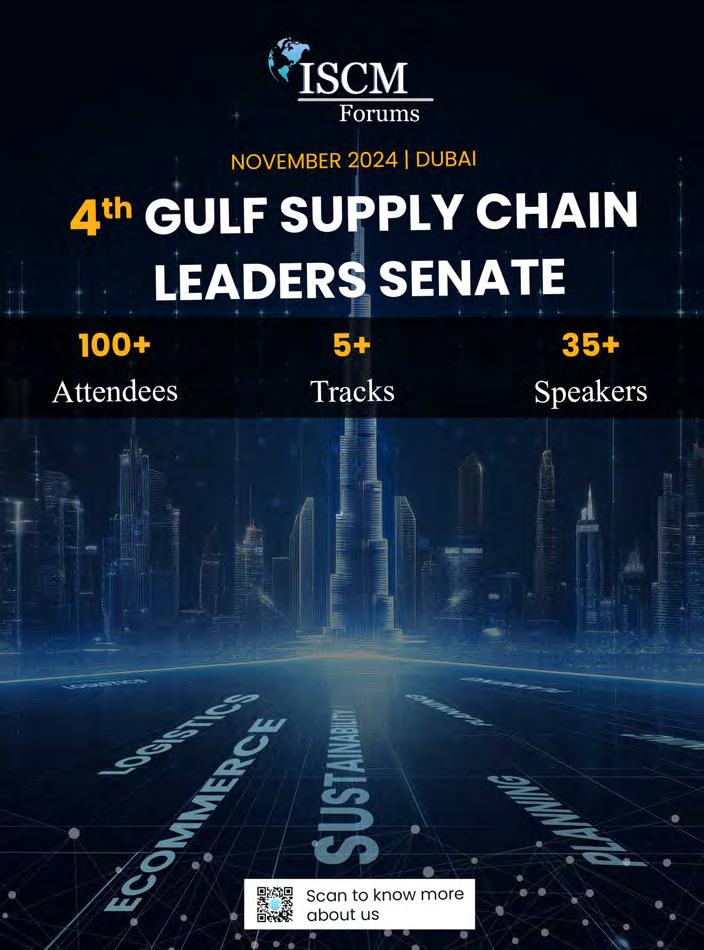
Dubai World Central—DWC, also known as Al Maktoum International Airport, will undergo a transformative expansion with the addition of the massive new passenger terminal. This ambitious project is a testimony to Dubai’s commitment to becoming the world’s largest aviation hub.
Dubai has recently unveiled plans to build a new passenger terminal at Al Maktoum International Airport (DWC) in anticipation of a spike in visitors, after halting the project for more than ten years.
Once completed, all operations at DXB will be transferred in the coming years. Emirates has been pushing for expansion of DWC to support its future growth plan.
HH Sheikh Mohammed Bin Rashid Al Maktoum, Vice President and Prime Minister of the UAE and Ruler of Dubai, has approved the designs for the new terminal, expected to cost AED 128bn (US$ 34.85bn), according to the Dubai
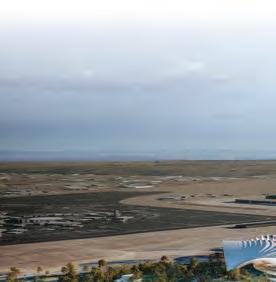

Government’s statement.
The new terminal is also expected to have a significant impact on Dubai’s economy. It will significantly increase the airport’s capacity. Once the capacity at DXB is transferred to DWC, it will enable it to handle up to 260mn passengers annually.
This expansion is not just about accommodating more travellers, it is about stimulating Dubai’s economic growth. The airport is poised to become a central pillar in Dubai’s economy, driving job creation, fostering tourism, and attracting international businesses who recognise Dubai as an important regional and global business hub.
The ambitious expansion project includes a US$ 2.7bn substructure contract for Concourse 1 and the West Terminal building, which encompasses various facilities such as tunnels, baggage handling systems, road networks, and support facilities.

The construction of the new passenger terminal at DWC Ultimatum Airport and the resulting development of the airport and surrounding Dubai South logistics park, is set to further cement Dubai’s position as a global leader in logistics, regional distribution and economic development.





Dubai’s Al Maktoum International Airport aims to become the world’s largest airport by 2050, with a capacity of up to 260 million passengers annually.
According to Dubai South, the urban master developer, DWC is slated to become the largest airport in the world once it is constructed and goes fully operational.
DWC will be home to the world’s largest airport once completed, and with a multi-modal transport infrastructure linking air, land, and sea. Along with the advantages of a business-friendly free zone, it will also provide a diverse range of residential options,” Dubai South said via Twitter, referring to the Dubai South urban development that has already started.
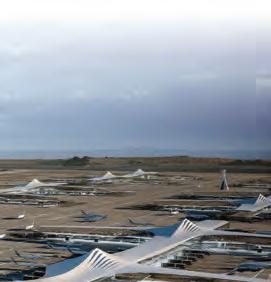




“The announcement of phase two of Dubai World Central - Al Maktoum International Airport’s (DWC) expansion, representing a substantial investment of AED128 billion, marks the start of a huge investment of resources by our many stakeholders in designing and building a state-of-theart airport that will provide a quick, convenient, and high-quality 21st-century experience for our customers. This further solidifies Dubai’s position as a leading aviation hub on the world stage.”
Paul Griffiths, CEO, Dubai Airports, stated that Dubai’s growth has always gone together with the growth of its aviation infrastructure, and today, one sees another bold step in that journey.
“The development of this new airport will be an integral part of Dubai’s economy and major contributor to the Dubai Economic Agenda (D33). It will generate estimated workforce and residential requirement for over a million people living and working in Dubai South (the aerotropolis), which has been under development and operation since 2007.”
Khalifa Al Zaffin, Executive Chairman, Dubai Aviation City Corporation, highlighted the economic benefits of the project.
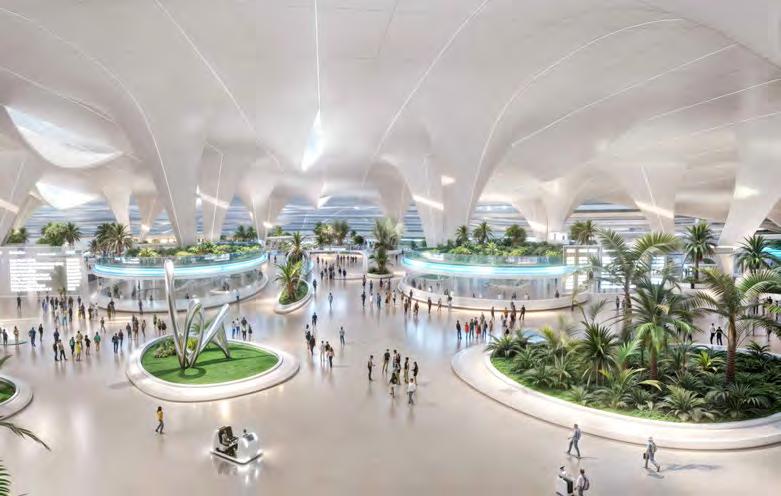
The Al Maktoum International Airport is already a functioning international airport, the home base of Fly Dubai, used by many cargo-freight charters including Emirates, and hosting the bi-annual Dubai Airshow. The government of Dubai already since 2007 had much bigger plans for the DWC facility as part of its long-term vision for Dubai.
Unfortunately, the global financial crisis which started in 2008 slowed the development of the airport down. Then in 2021, Covid-19 came along and again postponed any expansion plans. However, the government knew that at some point DXB airport, with its two runways, would run short of capacity to cater for the ambitious growth developments of Dubai and Emirates Airlines.
HH Sheikh Mohammed Bin Rashid recently reviewed the Master Plan for the Airport of the Future. During the event, HH was briefed on the key design features and strategic implementation plan for the airport.
“In keeping with the vision of HH Sheikh Mohammed Bin Rashid for the Aviation industry in Dubai, we announce the commencement of the design and construction process for the new airport at
Source: AFAR print and digital publication; April 15, 2024
Jebel Ali. It is expected that the first phase of the project will be ready within a period of 10 years, with a capacity to accommodate 150 million passengers annually,” affirmed
HH Sheikh Ahmed Bin Saeed Al Maktoum, President, Dubai Civil Aviation Authority, Chairman, Dubai Airports and Chairman and Chief Executive, Emirates Airline & Group
“The new airport, which will ultimately be over five times the size of Dubai International, will prepare the ground for the next 40 years of anticipated growth in Dubai’s aviation sector. It will respond to the Hub Airline ambitious plans in terms of fleet acquisition and passenger growth.
The airport will provide cutting-edge technologies, passenger facilities with unmatched level of service, and state-ofthe-art aviation support facilities,” HH Sheikh Ahmed Bin Saeed added.
Al Maktoum International is planned in a manner to represent a leap into the future. It will comprise of five parallel runways with a quadruple independent operation, west and east processing terminals, four satellite concourses with over 400 aircraft contact stands, uninterrupted automated people mover system for passengers, and an integrated landside transport hub for roads, Metro, and city air transport.

“Dubai South has already benefited over the past 10 years from the expected strategy to turn the airport city into the biggest airport in the world.”
DWC airport is located on the other side of Dubai. However, it has several huge advantages. Whilst DXB is penned in on all sides, DWC has plenty of space reserved for its expansion. It is also within proximity to Jebel Ali. It allows for the seamless movement of cargo between the seaport, Jebel Ali Port and the airport, Al Maktoum International Airport. It also allows for greater connectivity with the Port of Khalifa and KIZAD in Abu Dhabi, itself expanding rapidly and approximately 75km by road. With the addition of Etihad Rail and the Etihad rail terminal at Dubai Industrial City it will be able to seamlessly connect freight from across the UAE from and to the airport.
Under phase 2, Etihad Rail is anticipated to launch the prequalification process for the UAE’s high-speed rail line connecting Abu Dhabi and Dubai by the end of Q2-2024. The high-speed rail project is expected to reduce journey times between the UAE’s two largest cities. The new Etihad Rail terminal at Dubai Industrial City is near both Al Maktoum International Airport and Jebel Ali Port.
With so many infrastructure developments going into the three respective hubs as well as into Etihad Rail, the UAE further positions itself through DWC as global gateway connecting the world.
Once the DWC airport expansion is completed it will place Dubai even more
at the centre as a global transit passenger and logistics distribution hub. Two-thirds of the world’s population is within eight hours flying time.
Dubai South, formerly known as DWC, has already benefited over the past 10 years from the expected strategy to turn the airport city into the biggest airport in the world. Now with the expansion plans underway it will capitalise further and attract even more logistics and distribution companies to set up around the airport in support of their regional distribution activities.
Many of the large global 3PL companies already have multiple state-of-the-art facilities around the airport. Many global and regional retailers in recent years have also set up large warehouse facilities at DWC.
The airport logistics zone is also well positioned as regional e-commerce hub. Another important development at DWC has been the development of cold chain activities. Several healthcare facilities are located within the free zone as well as Emirates’s Pharma Hub.
Report compiled by
Eelco Dijkstra, International
EditorGlobal Supply Chain Middle East
Al Habtoor Motors, the sole distributor of JAC Motors in the UAE recently unveiled its latest fleet of JAC commercial vehicles, setting new benchmarks for reliability, versatility, and innovation in the country’s commercial vehicle segment.
The launch of the new series of JAC commercial vehicles, held at the Al Habtoor Grand Resort in Dubai, showcased a range of light and heavy-duty trucks and commercial vehicles, highlighting the latest innovations in the commercial vehicles sector to company delegates and key stakeholders, according to a corporate press communique.
The induction of the Heavy-Duty trucks complements the existing range of light commercial vehicles (LCVs) like the Sunray & M4 minibuses and cargo vans as well as the light trucks, which are already popular in this market.
Among the new vehicles displayed were the PROMATE 2049 and WORKMATE 4146, each manufactured with exceptional
attention to detail, to meet the specific needs of various commercial industries operating in the UAE.
Featuring spacious cabs, newly designed ergonomic dashboards and air suspensions fitted in each vehicle, these interior additions ensure a comfortable driving experience, even on long journeys, minimizing driver fatigue.
In terms of performance, all these vehicles have been equipped with powerful and technically advanced engines and latest transmissions, capable of serving several different applications and in the harshest conditions, whilst still maintaining both reliability and excellent fuel efficiency.

The vehicles also excel in their loading capabilities to transport several tons of materials with absolute ease, the press statement continued.
Specially curated for the UAE market, these vehicles have been designed to enhance reliability and enable them to handle various weather and terrain conditions with effortless ease. With their robust structures and build quality, safety and efficiency have been optimized to allow for the greatest results in all manners of work.
“JAC Motors is renowned for its reliability and has proven to be an exceptional partner for Al Habtoor Motors. The advent of this latest range of Heavy-Duty Vehicles represents a significant leap forward in our commercial vehicle offerings in the market and advancement in technology,” affirmed Karim Maksoud, Managing Director, Al Habtoor Motors.
“These vehicles are not just modes of transportation; they are innovations tailored to meet the diverse needs of industries across the UAE. Every aspect has been engineered to enhance performance and reliability, ultimately benefiting sectors such as construction, logistics and transportation,” he added.
With this new launch, JAC Motors solidifies its position as the leading Chinese commercial vehicle exporter, creating trustworthy solutions for clients in the UAE and worldwide, the press note concluded.
Established in 1964, the JAC Group is a top Chinese automobile and commercial vehicle manufacturer. The company is based in Hefei, Anhui Province, China.

IVECO and Arabian Auto Agency (AAA), the manufacturer’s official dealer in the Kingdom of Saudi Arabia, recently delivered 55 Daily model 50C15V18 18m3 loading capacity to Theeb Rent -A-Car Co., in Riyadh.
Long-established and leading vehicle rental company, Theeb Rent-A-Car Co. has an extensive wide-ranging inventory of multi-faceted vehicles that comprise a wide range of transportation solutions for both long and short-term rentals to a wide base of customers from different industry categories and sectors including personal and commercial.
These 55 Daily Van 18m3 loading capacity are equipped with refrigerator unit and will be added to the fleet of Shahina Logistics, a prominent Saudi Arabian transporter and logistics services provider, on long rental basis for their meat products distribution to the main supermarket retail chains, nationwide. The 55 Daily is most versatile vehicle in its class that will serve the Saudi
Arabia territory nationwide, according to a press communique.
All the Daily models 50C15V18 have been produced at IVECO’s Suzzara plant (a commune in the Province of Mantua, in the Italian region of Lombardy) and refrigerators have been mounted directly in Riyadh.
“Since the beginning of 2024, the Arabian Auto Agency Co. has recorded great achievements and signed high-class


“The Daily is the only vehicle in its class that ranges from 3.5 ton all the way up to 7.2 ton of gross vehicle weight, with wheelbases from 3000 to 5100 mm.”
strategic partnerships, and these are the results of what we have achieved during the previous years of hard work, maintaining the level of service and customer satisfaction, and we will work to reach the summit as we aspire,” stressed Fayez Alsino, Regional Sales Manager, Arabian Auto Agency.
“This is a strong signal of IVECO’s continuous growth in this key Saudi Arabian market through its full range of vehicles; after the recent deliveries that saw our IVECO S-Way, IVECO T-Way and Eurocargo models enter the Kingdom’s market. We are now progressing well in this very challenging light commercial vehicle sector in the Middle East,” stressed Alberto Pellegrini, IVECO Business Manager, Saudi Arabia.
“The Saudi Arabian market is quickly evolving and growing, so as a consequence, IVECO together with our official distributor Arabian Auto Agency is ready to seize the opportunity and take up the challenge,” he assured.
The Daily features an entirely new driver seat with central pads of the cushion and backrest in memory foam, an industry first for Light Commercial Vehicles.
Theeb Rent-A-Car Co., established in 1991, now has more than 52 branches nationwide and over 33,000 vehicles across the Kingdom. The Theeb Company is considered the largest car rental and operational leasing company in Saudi Arabia.
The Daily is the most versatile vehicle in its class. Its extensive model line-up and bodywork options open up a wealth of opportunities: whatever the mission, one can find and customize the Daily to perfectly match your operational and business requirements.
The Daily offers the widest line-up in the industry, it is the only vehicle in its class that ranges from 3.5 ton all the way up to 7.2 ton of gross vehicle weight, with wheelbases from 3000 to 5100 mm, opening up a wealth of possibilities for a wide variety of
missions from urban deliveries to heavier transport jobs in the construction sector. It is designed and built to offer endless bodywork options, making it easy to customize for your specific needs. It is perfect for highly specialized and demanding adaptations, such as rescue vehicles or ambulances.
New memory foam seats: adapt to the driver to provide supreme comfort. The Daily features an entirely new driver seat with central pads of the cushion and backrest in memory foam, an industry first for Light Commercial Vehicles.
The foam moulds to the body, distributing the weight evenly, reducing pressure peaks by up to 30%. This results in supreme comfort and protects you from back pain. The side sections have been thickened with 15mm of high-density foam to improve lateral containment, enhancing safety and the driving experience.
Taller people will be more comfortable with the 20 mm longer and 15 mm thicker front cushion, which provides better support for their longer legs. The seat side levers have been redesigned to make it easier to get on and off the vehicle, ideal for door-to-door and parcel delivery missions that require frequent exits.
Preserving temperaturesensitive goods is crucial in supply chain integrity, and the delivery of safe to consume product. The cold chain ensures product safety during shipping, transportation and storage.
Stringent regulations and standards shape Qatar’s cold chain market, ensuring product integrity. Amid progress and innovation, Qatar’s cold chain market offers opportunity. With ongoing investments, Qatar is set for cold chain sector growth, aligning with its vision for a prosperous future.
“We offer end-to-end solutions tailored to the unique requirements of each client and their specific cold chain needs,” remarked Ranjeev Menon, Group CEO, GWC.
The cold chain refers to the uninterrupted series of storage and distribution activities that maintain a product’s desired temperature range. This process is critical for preserving the quality, efficacy, and safety of temperature-sensitive goods, including food, pharmaceuticals, and vaccines.
Qatar’s first privately-owned 3PL pharmaceutical storage and distribution spans a 25,000sqm facility with temperature-controlled, refrigerated, and frozen storage chambers, built and equipped to the latest industry specifications.
This facility can store temperaturesensitive products anywhere between

-70°C and 25°C across more than 35,000 pallet positions. In addition, GWC’s existing countrywide infrastructure includes vaccine and sample transportation strategies that ensure temperature-controlled transportation, labelling, and tagging.
IoT systems are equipped with sensors that continuously monitor temperature levels, providing instant alerts in case of any deviation from the prescribed range. This proactive approach allows GWC to swiftly address any issues and maintain the integrity of the cold chain.
Quality assurance sits at the core of cold chain operations. GWC adheres to stringent quality control protocols at every stage of the supply chain, from receiving point to final delivery. GWC’s quality assurance team conducts regular audits and inspections to ensure compliance with regulatory requirements and industry best practices.
With the largest transport fleet in Qatar under its command, specialized trucks are dedicated to cold transportation. These refrigerated and insulated vehicles can
maintain precise temperature conditions during transit. Whether short-haul or longhaul transportation, drivers are trained to handle sensitive cargo with utmost care and attention to detail.
Cold chain logistics solutions played a central role in ensuring the seamless transportation and storage of food and beverages, to maintain their quality and safety standards. This involved extensive planning and coordination efforts between stakeholders, including tournament organisers, suppliers, logistics partners, and regulatory authorities.
Entrusting cold chain logistics to a 3PL provider unlocks numerous benefits for businesses. With expertise in shipping, transportation, warehousing, inventory management and distribution; companies can prioritize core competencies such as product innovation and customer relationships.
This strategic partnership fosters competitiveness, innovation, and accelerated growth, ensuring seamless operations, value addition and customer satisfaction.






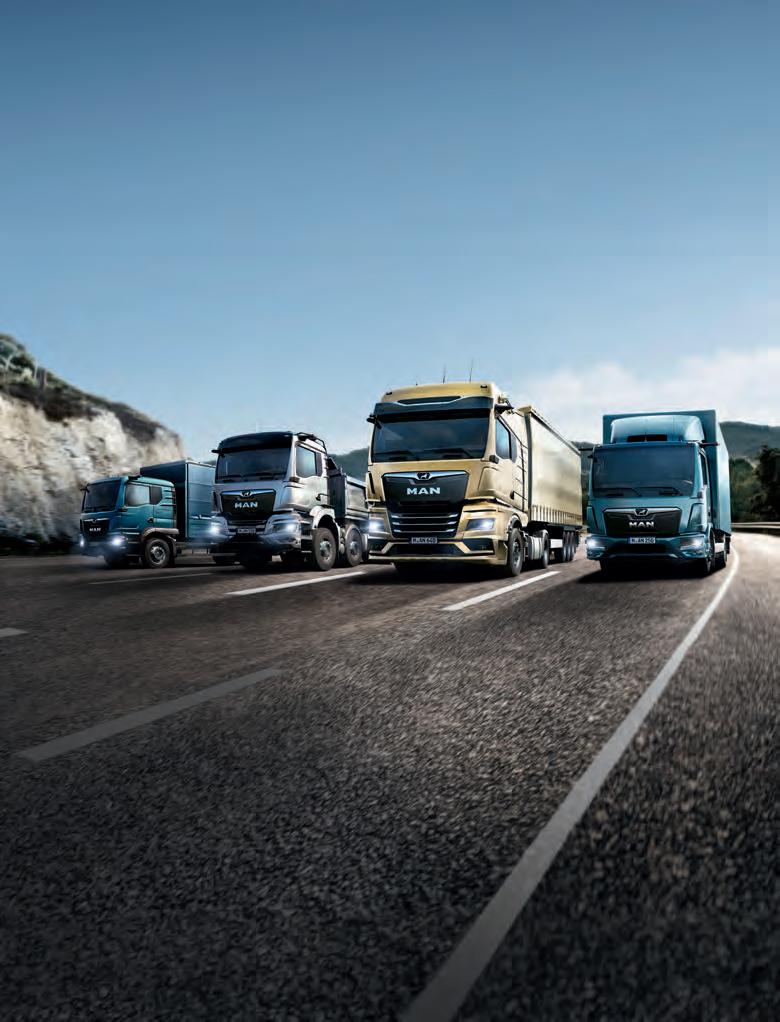
Qatar Free Zones Authority (QFZ) and FedEx Logistics recently signed a Memorandum of Understanding (MoU) to facilitate the establishment of a regional logistics facility in Qatar’s free zones.

The newly acquired FedEx facility in the Qatar Free Zones (QFZ) will operate under the company’s FedEx Trade Networks Transport & Brokerage division and will be located in the Ras Bufontas Free Zone and will include a stateof-the-art logistics office.
The MoU was signed by Sheikh Mohammed Bin Hamad Bin Faisal Al-Thani, CEO, Qatar Free Zones Authority (QFZ), and Patrick Moebel, President and CEO, FedEx Logistics, in a ceremony that took place on the sidelines of their participation at the Qatar Economic Forum, following a productive panel discussion titled ‘Connecting to the Shifting Global Supply Chain Network’ that brought together QFZ and FedEx Logistics.
The new facility will help continue to support the expansion of FedEx Logistics with seamless integration into the FedEx
global network, serving as a key gateway for international cargo transition in the region between Asia and Europe.
The location of the FedEx Logistics facility in Ras Bufontas Free Zone, adjacent to the award-winning Hamad International Airport and Qatar Airways, will provide enhanced access to air transportation and freight, efficient customs processing time, convenience, and the opportunity to grow business in the region.
“The collaboration between QFZ and FedEx Logistics will help accelerate the flow of goods and strengthen supply chains, benefitting economies on a global scale,” affirmed Sheikh Mohammed Al-Thani.
“The FedEx Logistics investment in QFZ reflects a shared commitment to growth and innovation within the logistics sector. The collaboration leverages the world-class expertise and global network of FedEx and will undoubtedly contribute to highlighting Qatar as a preferred business destination,” he added.
“The regional facility in QFZ will enable us to better serve our customers not just in the region between Asia and Europe, but also around the world,” asserted Moebel.
“Together with QFZ, we are furthering our shared vision for innovation, efficiency, and growth in this dynamic market. We are excited to be at the forefront of this transformative journey and shaping the future of logistics in Qatar,” stated Kami Viswanathan, President of FedEx Express Middle East, Indian Subcontinent and Africa.
Located at the heart of the Gulf at the intersection of three continents, and with access to 60% of the world’s population within eight hours flying time and five days sailing time, the freight and logistics market in Qatar has been growing steadily. This along with the continued expansion of air and seaports are positioning Qatar to be a logistics leader, a press communique concluded.
Our SynQ software delivers data-driven intelligence that empowers your business by synchronizing the performance of your people, processes and machines. The result is a level of efficiency and performance you never thought possible.
swisslog.com

Connectivity is increasing, with 60% of regional trade activity occurring between Silk Road economies—Oliver Wyman Report


Amajor new report from Oliver Wyman, a global management consulting
firm and a business of Marsh McLennan has identified a range of priority economic opportunities in the ‘New Silk Road’ region that stretches across Asia, Middle East and North Africa.
The New Silk Road – Growth, Connection, Opportunity identities six key areas that have emerged in the increasingly interwoven economies of Asia and the MENA region. The authors argue that a new phase has begun in the relationship, driven by intraregional flows of capital, talent, and technology, and sharpened as business activity expands beyond trade and construction into a range of new sectors, including automotive, clean technology, and artificial intelligence.
One of the dynamic factors reshaping the economies of the region is the increasingly assertive role of GCC countries, which are leveraging high energy prices to diversify their economies and secure their post-oil


futures through investment into financial services, logistics, tourism, technology, and manufacturing. The report cites the long-term strategic plans of the Kingdom of Saudi Arabia and the United Arab Emirates as particularly important in this regard.
The six themes covered in the report are Energy Transition, Mobility & Transport, Financial Services, Supply Chain, Emerging Payments, and Digital Disruption, with a focus on outlining specific action steps for private sector and government organizations to enable them to prosper in this evolving environment.
“The countries that are part of the New Silk Road region are powering ahead with economic opportunity being driven by three major triggers: energy transition, global supply chain disruption, and geopolitical tensions and regionalization. Each of these core shifts are reshaping
and generating opportunities in a region that accounts for over 40% of the global economy,” explained Adel Alfalasi, Head of the UAE, Oliver Wyman, Partner in the Government and Public Institutions Practice and a co-author of the report.
The report’s definition of the New Silk Road extends across Asia, the Middle East, and North Africa, with a particular focus on the 20 largest economies that account for 95% of the region’s GDP. It highlights several key macroeconomic factors that are driving economic development and innovation.
“We envisage a region where energy ties will grow tighter, clean technology will play a greater role, and where manufacturing supply chains will spread out across a wider set of countries as companies build resilience,” says Ben Simpfendorfer, Asia Pacific Lead, Oliver Wyman Forum, a Partner at Oliver Wyman, and a co-author of the report.

An exciting new collaboration was forged during the 3rd edition of the Future Aviation Forum in Riyadh between Saudia Technic and Saudia Cargo.
The signed agreement will establish Saudia Cargo’s new headquarters at Saudia Technic’s Maintenance, Repair, and Overhaul (MRO) Village, located at King Abdulaziz International Airport in Jeddah.
The five-year agreement, set to take effect before the end of September 2025, will enable Saudia Cargo to lease and operate 6000sqm of space within Saudia Technic’s largest MRO Village in the MENA region.
“We are not just establishing a contractual agreement; we’re embracing a future characterized by partnership
and ingenuity,” affirmed Captain Fahd. H. Cynndy, CEO, Saudia Technic.
“Together, we look forward to shaping the future of air cargo and aircraft maintenance services with a united vision and shared expertise,” asserted Teddy Zebits, CEO, Saudia Cargo.
The agreement signed between the two parties will play a significant role in fostering a culture of innovation and cross-functional teamwork, driving continuous improvement, and enhancing collaboration and synergy across Saudia Group’s subsidiaries, the press statement concluded.
The Saudia Group, represented by Saudia, the national flag carrier of Saudi Arabia, and flyadeal, the group’s low-cost carrier, recently signed a firm order for an additional 105 A320neo Family aircraft.

The importance of adhering to the International Air Transport Association Dangerous Goods Regulations (IATA DGR) is paramount from the perspective of the General Civil Aviation Authority (GCAA) of the UAE, particularly concerning the air transport of mobile phones and perfumery products.
The GCAA is acutely aware of the UAE’s challenges in handling mobile phones and perfumes, given the UAE’s significant role as a global distribution hub. In response, regulations from IATA, ICAO, and the GCAA in CAR Part VI offer straightforward guidelines for ensuring air safety.
These rules are easy to follow, ensuring compliance and safety in air transportation. By adhering to international standards and implementing stringent regulations, the GCAA ensures the safety of transporting mobile phones and perfumes, bolstering the UAE’s reputation as a leading aviation hub.
The pivotal step lies in training employees certified by both IATA and GCAA. This training aims to minimize risks and collateral damage to companies by ensuring employees are well-versed in regulations.
With proper training, employees can manage goods safely, reducing accidents and ensuring compliance.
IATA offers job function-based training, which can be tailored to suit the workforce’s needs. Approved training providers can help identify the most suitable training for each job role.
The author of this contribution is Neeraj Arora, Founder & Managing Director, Aviation Training Centre—ATC, Dubai
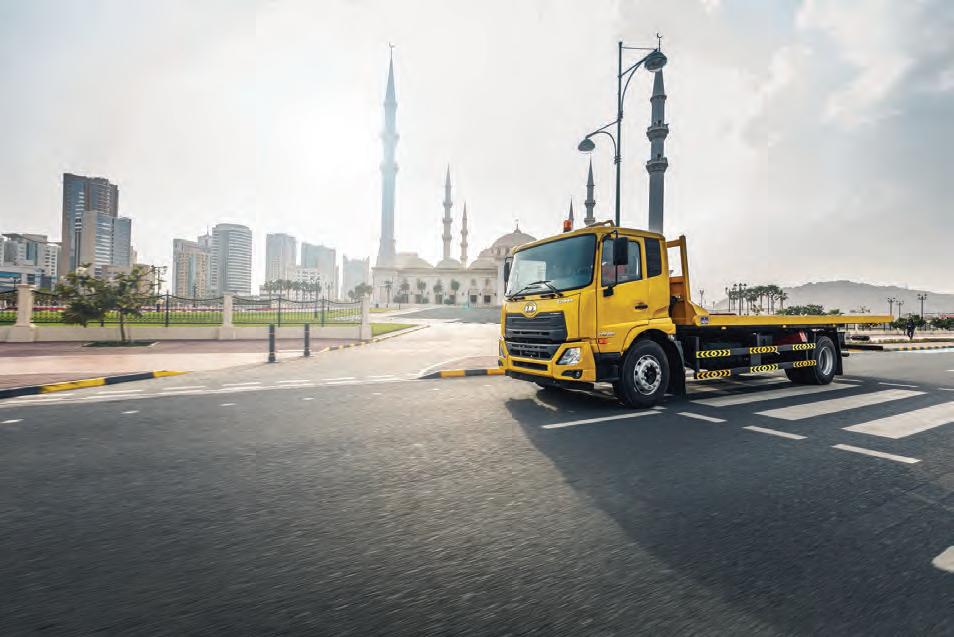
Benefits of having Automatic transmission.
• The optional automatic transmission knows the best gear to engage in any situation and allows for quicker yet efficient and optimal cruising speeds. That means more trips per day and a boost to overall productivity.
• Direct coupling “lock up” function for enhanced fuel efficiency and performance.
Wide range of choices to keep every type of business on schedule.
• 3 GVW ranges from 19 – 10.4 Tones.
• Up to 21 different basic configurations.
• 8 & 5ltr engines with 180hp – 280hp.
• Euro 5 emission levels.



 GH8E Engine + Automatic Transmission + 11ton Rear Axle
GH8E Engine + Automatic Transmission + 11ton Rear Axle
n Unifeeder Group has continued its expansion in Latin America (LATAM) with the opening of its first office in the region, located in Panama City. This latest investment follows the opening of new routes across LATAM, as the business seeks to unlock trade and boost economic growth in the region.
The new Panama team will support the Unifeeder businesses across LATAM in close coordination with global HQ in Aarhus, Denmark. Unifeeder will handle more than 200,000 twenty-foot containers (TEUs) and complete 800 port calls in the region in 2024 and has plans to develop its LATAM operations further in the coming years.
Unifeeder is a leading multi-regional feeder and container operator, transferring goods to and from smaller ports to hub ports for further transportation. It is a core part of DP World and serves hundreds of
ports throughout Europe, Asia, the Indian Subcontinent, Middle East, Africa and the Americas.
Unifeeder’s latest expansion across LATAM started in 2023, as part of its strategic focus on the Americas as a significant location for regional and global trade. The routes include feeder services between Hispaniola-Puerto Rico, Colombia-Panama and to Aruba and Curacao.
“At Unifeeder, we deliver flexible and agile global supply chain solutions. Opening offices in key markets including Panama and introducing new direct feeder services means we can not only offer enhanced logistics options to our customers,” affirmed Jesper Kristensen, Group CEO, Unifeeder Group and Group COO, Marine Services, DP World.
“As DP World continues to expand in the region, the opening of our first


Jesper Kristensen, Group CEO, Unifeeder Group and Group COO, Marine Services, DP World.
office in Panama and the introduction of new feeder coverage represent a key step forward in our strategy to become the logistics partner of choice in the region,” asserted Morten Johansen, EVP Americas, DP World.
n Dubai South and Aldar Properties will develop a build to suit facility for Kuehne+Nagel, one of the world’s leading logistics providers, at EZDubai, the fully dedicated e-commerce hub in Dubai South, it was announced in a press communication.
Located in close proximity and direct access to Al Maktoum International Airport, as well as Jebel Ali port via a bounded logistics corridor, the logistics facility is being developed as part of the joint venture between Dubai South and Aldar to develop Grade A logistics facilities at Dubai South’s Logistics District. The facility is expected to be handed over to Kuehne+Nagel by Q2-2025.
Spanning 22,915sqm, the facility will provide third-party logistics (3PL), e-commerce, and goods handling services, and is designed to include office space, warehousing capabilities, and an amenities block.
The facility was designed to attain a LEED Silver Certification by incorporating efficient design and energy-saving elements. The building’s flooring will feature an innovative system utilizing highperformance steel fibers, including those sourced from repurposed end-of-life tire
wire and cord, ensuring both strength and reduced carbon footprint.
The agreement was recently signed at Dubai South headquarters in the presence of Mohsen Ahmad, CEO, Logistics District, Dubai South; Jonathan Emery, CEO, Aldar Development; Lee I’Ons, GCC+ Managing Director, Kuehne+Nagel, as well as other senior executives from the three entities.
“Our partnership with Aldar is a strategic one, and we are committed to attracting the top players to contribute to the key priorities of the Dubai Economic Agenda ‘D33’- in establishing Dubai as one of the
top five logistics hubs in the world,” stated Mohsen Ahmad.
“We continue to activate the initial AED 1bn investment we committed to the sector and look forward to making further announcements this year,” commented Emery.
“Thanks to the strategic location of EZ Dubai, a carefully designed e-commerce zone by Dubai South, Aldar’s strong development capabilities, and Kuehne+Nagel’s global expertise in handling e-commerce, the new Fulfillment Centre will further strengthen our successful cooperation,” remarked Lee l’Ons.

n Top Swedish truck manufacturer Scania has reported strong Q1-2024 sales, all-time high earnings, and growing market shares due to the successful rollout of Scania Super.

Scania Group net sales grew by 20 percent to SEK 55.1bn (Swedish Kroner) 55.1 (US$ 5.028bn), according to a press statement.
Highlights are as follows:
• Adjusted operating income reached SEK 8.0bn and adjusted operating margin was 14.5 percent.
• Vehicle deliveries increased by 17 percent to 26,496 vehicles, whereof Zero Emission Vehicles (ZEV) amounted to 47 units.
• Cash flow amounted to SEK 7.1bn in Vehicles and Services.
• Order intake increased by 7 percent to 20,171 vehicles, whereof Zero Emission Vehicles amounted to 133 units.
The global truck demand remains stable, supported by sustained fleet utilisation and replacement needs. The
rebound in Latin America, driven mainly by the strong development in Brazil’s agricultural and mining sectors, continues and more than offset the somewhat more normalised market demand in Europe.
Scania’s efforts to create a more resilient vehicle order-to-delivery flow resulted in increased volume, shorter lead times, and improved delivery precision. The increased volume and improved capacity utilisation positively impacted profitability.
“Scania achieved strong sales and its best-ever quarterly earnings. This success is attributed to high production volumes, with deliveries increasing by 17 percent compared to last year. Additionally, the rollout of our new fuel-efficient Scania Super has increased our market shares,” affirmed Christian Levin, President and CEO, Scania.
n SAL, Saudi Arabia’s leading logistics and supply chain solutions provider, has announced the launch of its Fulfillment Business Unit, a one-stop-shop solution aimed at revolutionizing the logistics and supply chain industry in the Kingdom.
SAL’s Fulfillment Services represent a comprehensive commitment to meet the growing requirements and accelerated needs in the logistics sector at the Saudi market. By successfully providing an integrated approach that combines air cargo handling and logistics solutions, SAL is introducing its new sector to enhance operational efficiency and increase reliability, the Kingdom’s premier logistics services provider revealed in a press communique.
With a vision to transform the logistics landscape, SAL’s Fulfillment Services are designed as a one-stop-shop solution. Leveraging its strong foothold as a leading logistics company with an expansive logistics network, SAL aims to address the growing demand for integrated fulfillment services in the Saudi market.
The heart of SAL’s Fulfillment Business Unit lies in its holistic approach, combining a comprehensive suite of value-added services with expertise in cold chain
logistics and robust digital enablement. By seamlessly integrating fulfillment and logistics solutions, SAL today is offering an integrated service that extends from the first mile to the last.
SAL’s Fulfilment centers will offer advanced Warehouse Management System (WMS), which serves as the backbone of its digital strategy, providing customers with real-time access to operational data and metrics. This digital platform enables users to place orders, track their progress, and generate customized reports, enhancing operational transparency and efficiency.
As part of its expansion strategy, SAL is investing in the establishment of a
growing network of Fulfillment centers in key locations in the kingdom. With targeted facilities in Riyadh, Jeddah port and Dammam port, SAL’s state-of-the-art warehouses serve a variety of industries, ranging from perishable goods to pharmaceuticals and high-value materials.
“Our Fulfillment Services represent our solid commitment to delivering unparalleled logistics solutions,” affirmed Faisal Albedah, CEO, SAL. “With our extensive network, cutting-edge technologies, and dedicated team, we are well-positioned to meet the evolving needs of our customers and drive growth in the Saudi logistics sector,” he concluded.

n Qatari Investors Group (QIG), a diversified conglomerate listed on the Qatar stock exchange, has signed a partnership agreement with global technology company SAP that will enable it to leverage the benefits of SAP’s cloud ERP solution, with data securely hosted in Qatar.
QIG will move its mission-critical business processes from its legacy onpremises ERP software systems to SAP S/4HANA Cloud, an enterprise resource planning (ERP) solution that enables 360-degree visibility and greater control over all operations, it was revealed via a corporate press communique.
The move will be accelerated through the adoption of RISE with SAP, a comprehensive subscription offering regular updates to make QIG more resilient and agile in today’s rapidly changing global market.
“With RISE with SAP Cloud, QIG can transition to cloud without business risk, while gaining advantages from automated processes that allow us to concentrate on innovation and growth,” explained Joseph Abdo, Chief Executive Officer, QIG.

“We will see immediate benefits, such as streamlined operations and increased efficiencies, while setting ourselves up for long-term success, with automatic upgrades to new technologies and a scalable and flexible digital infrastructure,” he continued.
A key motivator for QIG in selecting SAP as its digital transformation partner was SAP’s deep expertise in multiple industries, and the ease of establishing an integrated platform to manage diverse operations.
QIG’s subsidiaries and business interests include building and
construction materials and services–such as the group’s flagship project, Al Khalij Cement Company–as well as technology, marine services, property, project development, contracting and financial services, the press statement continued.
“RISE with SAP enables customers to adapt to fast-changing conditions, from rapidly evolving AI applications to cybersecurity threats. The deployment will make QIG increasingly resilient, efficient, and agile, while also allowing it to innovate more quickly and easily,” asserted Alaa Jaber, Managing Director, SAP, Qatar and Fast Growth Markets.
n Hellmann Calipar Healthcare Logistics (HCHL) and Boston Scientific Corporation (BSC) have joined forces to establish a dedicated distribution centre for the EMEA emerging markets.
Representatives from both organizations, along with local authorities, gathered to commemorate the inauguration of the new warehouse, which will provide access to a broad portfolio of cutting-edge medical devices for the region, according to a press statement.
As part of this collaboration, Hellmann Calipar Healthcare Logistics, a strategic joint venture between Hellmann Worldwide Logistics and an affiliate of Indian-based Parekh Integrated services, will deliver comprehensive logistics solutions for Boston Scientific.
The newly established distribution centre will serve distributors and Boston’s T2 warehouses across EMEA emerging markets. As an integrated healthcare logistics
provider, Hellmann Calipar will also offer localization services to customize products to specific market needs.
The new multi-user facility, strategically located in Dubai South, amidst the integrated free zones of DWC and JAFZA, spans an impressive 5400sqm. With a capacity of 1900 pallets and 5500 CBM of shelving storage, the warehouse is well equipped to support Boston Scientific’s ambitious growth objectives in the region.
“We look forward to contributing to the
success of Boston Scientific in the region and anticipate a successful and enduring partnership based on our shared values,” remarked Madhav Kurup, Regional CEO IMEA (Indian Subcontinent, Middle East and Africa), Hellmann Worldwide Logistics.
“Our partnership with Boston is built on shared values and a mission to deliver innovative and high-quality healthcare products for the patients,” commented Anna Mansurova, Managing Director, Hellmann Calipar Healthcare Logistics.
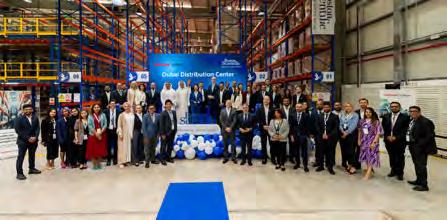
n AP Moller - Maersk’s (Maersk) first large vessel that can run on green methanol arrived in Dubai, UAE for the very first time and was welcomed by DP World at Jebel Ali. Ane Maersk underscores Maersk’s ambition to achieve Net-Zero greenhouse gas emissions by 2040, according to a corporate press communique.
Serving the AE7 string, which connects Asia and Europe, Ane Maersk arrived in the UAE on her rotation, beginning in Hamburg in Germany and covering several ports in Europe, the Mediterranean and the Gulf countries.
“It is truly a great moment to witness the arrival of Ane Maersk at DP World, Jebel Ali. This is an important milestone for Maersk in our journey to decarbonise ocean transportation,” noted Christopher Cook, Managing Director, Maersk UAE, Oman and Qatar.
“Ane Maersk represents our ambitions towards sustainability and innovation. We are also fully aware that we cannot bring about the green transition all by ourselves. It requires collaboration from the entire ecosystem,
including our customers, our partners, the infrastructure, regulators and other stakeholders,” he continued.
“We are proud to welcome the Ane Maersk to Jebel Ali, whose arrival highlights the green shift underway in our industry. It is a flagship for sustainability that mirrors our own carbon reduction ambitions at DP World,” observed Abdulla Bin Damithan, CEO and Managing Director, DP World GCC.
As the biggest port in the Middle
East and the 10th busiest in the world, Jebel Ali Port is a global trade hub that provides connectivity to over 180 shipping lines and access to more than 3.5 billion consumers.
During Ane Maersk’s first call at Jebel Ali, Danish Consul-General in the UAE HE Joakim Larsen, DP World GCC CEO and Managing Director, Abdulla Bin Damithan, several top customers and partners for Maersk had the opportunity to get onboard the vessel.

n Dubai South, the largest single-urban master development focusing on aviation, logistics and real estate, recently announced the signing of an agreement with AGMC, one of the leading importers of luxury vehicles in the UAE.
Accordingly, a new AED 500mn showroom and service centre at Dubai South to serve customers of its automotive brands BMW, MINI, Rolls Royce and other brands.
The agreement was signed in the presence of HH Sheikh Sultan Ahmed Mohamed Al Qassimi; HE Khalifa Al Zaffin, Executive Chairman, Dubai Aviation City Corporation and Dubai South; Nabil Al Kindi, CEO, Dubai South Properties; Jan Felton, Managing Director, Al Batha Group, parent company of AGMC, and other senior executives from both entities.
The new state-of-the-art facility, which will be built to the highest standards surpassing any existing facilities, spans 33,000sqm and will feature BMW, MINI, Rolls Royce and other
brands vehicles, as well as a fully-fledged service centre to provide customers with after-sales and maintenance services.
“We are pleased to sign this agreement with one of the UAE’s leading automotive dealers that will expand its presence at Dubai South following BMW Group Middle East’s Training Centre,” remarked HE Khalifa Al Zaffin.
Jan Felton expressed his happiness in being part of progressive development
plans of Dubai South aligning with the Vision of the UAE Leadership.
Dubai South is Dubai’s largest single urban master development focusing on an aviation and logistics ecosystem that houses the world’s largest airport when fully operational, complemented by a multi-modal transport infrastructure connecting air, land and sea, a press communique concluded.

n Khalifa Economic Zones Abu Dhabi –KEZAD Group and UAE-based Golden Spike and Wheat today announced the signing of a 50-year land lease agreement for the establishment of a bakery and sweets manufacturing facility in KEZAD.
The 26,000sqm facility in ICAD 3 (KEZAD Musaffah) will have a large production capacity to cater to the requirements of the UAE market.
“The Golden Spike facility would be well positioned to augment these efforts and play a significant role in the country’s food security efforts,” commented Mohamed Al Khadar Al Ahmed, CEO, Khalifa Economic Zones Abu Dhabi–KEZAD Group.
“With its extensive infrastructure investments and dedication to integrating advanced agricultural technologies (AgTech) that cater to the evolving needs of the industry, KEZAD is crucial in repositioning the UAE, and particularly

Abu Dhabi, as a leading Food and AgTech hub of the Middle East,” remarked Mustafa Al Husseiny, General Manager, Golden Spike and Wheat.
The upcoming 3.3sq km Abu Dhabi Food Hub in KEZAD, as well as a number KEZAD clients in the F&B sector, along with sustainable solutions in the
AgTech industry, such as vertical farming and hydroponics, are crucial initiatives in a region with limited arable land and water resources.
These efforts support the UAE’s food security objectives while ensuring environmental sustainability, a press communication concluded.
n Emaar, The Economic City, the masterdeveloper of King Abdullah Economic City (KAEC), has signed an agreement with Aramex, a leading global provider of comprehensive logistics and transportation solutions, to implement sustainable and value-added logistics solutions in KAEC to minimise environmental impact and enhance operational efficiency.
The agreement was signed by Sami AlNajrani, Chief Operating Officer and Advisor to the Chairman, KAEC; and Mahmoud Asha, General Manager, Western Region, Aramex, on behalf of Abdulaziz Abdullah Al Nuwaiser, the General Manager, during a ceremony attended by numerous renowned personalities. Rayan Albakri, Deputy Minister of Logistics Services at the Ministry of Transport and Logistic Services; Mazen AlSaleh, Vice Secretary General-Economic Cites at Economic Cities and Special Zones Authority (ECZA); and Mansour Al Salem, the Managing Director of Emaar, The Economic City, attended this ceremony.
First multi-compartment robot
The first multi-compartment robot used for logistics operations, custom-designed by
Aramex through the support of its partner Ottonomy, allows for multiple deliveries per trip, thus optimizing overall operations and paving the way for cheaper delivery costs.
“We seek to implement a variety of eco-friendly logistics solutions under this agreement, particularly Bot deliveries, which would be implemented for the first time in KSA,” commented Mansour
Al-Salem, Managing Director of Emaar, The Economic City.
“We at Aramex are dedicated to promoting innovation and implementing eco-friendly solutions that improve our logistical capabilities and reduce the impact of our operations on the environment,” remarked Abdulaziz Abdullah Al Nowaiser, General Manager, Aramex.

n Gecko Robotics and Al Masaood Energy recently announced a multi-year contract with ADNOC Gas, an integrated gas processing company and a subsidiary of Abu Dhabi National Oil Company (ADNOC), one of the world’s largest integrated energy companies.
The contract, with an estimated ceiling of US$ 30mn, will see the utilization of Gecko’s industry-leading robots and AI-powered data platform across ADNOC Gas sites facilitating predictive maintenance to increase efficiencies, reduce downtime and CO2 emissions, while also maintaining HSE best practice for the safety of its employees and contractors, according to a press communique.
“ADNOC and the UAE are at the forefront of using Industry 4.0 tools to boost efficiency and decrease their carbon footprint - and the world is noticing,” stated Jake Loosararian, Co-Founder and CEO, Gecko Robotics.
Gecko’s wall-climbing robots use specially designed sensor payloads that
build sophisticated digital maps of critical assets. Gecko software platform, Cantilever, takes that data and combines it with operational data to allow for precision repairs and preventive maintenance.
Many companies and government agencies use Gecko’s software to extend the lifespan and efficiency of critical infrastructure, including power plants, oil refineries, manufacturing facilities, and other assets, the press statement continued.
“The partnership between Gecko and Al Masaood Energy serves as a compelling demonstration of how
cutting-edge technologies can be instrumental in realizing the nation’s ambitious net zero objectives” commented Ahmad El Tannir, General Manager, Al Masaood Energy.
The partnership with ADNOC Gas and Al Masaood Energy comes after Gecko Robotics announced the opening of its new international headquarters in the UAE under the Ministry of Economy’s NextGenFDI program which was launched to attract innovative solutions providers in the technology space to establish and scale operations within the UAE.

n Qatar Free Zones Authority (QFZ) and Evonik, a leading specialty chemicals company headquartered in Germany, have signed a Memorandum of Understanding (MoU) on the sidelines of the recently concluded Qatar Economic Forum in the Qatari capital Doha.
The common aim is to explore specific investment opportunities focused on sustainable solutions for energy transition.
As an important cornerstone of Evonik’s strategy to enable green transformation, the company’s smart materials portfolio consists of a variety of innovative products, including membranes for gas separation. Potential future investments are foreseen to take place in Umm Alhoul free zone in the State of Qatar.
The MoU was signed by Sheikh Mohammed Bin Hamad Bin Faisal Al-Thani, CEO, Qatar Free Zones Authority, and Joerg Syrzisko, President, EMEA Region, Evonik, at a ceremony attended by senior executives from both entities, according to a press communique.
“We are delighted to sign this MoU with Evonik with the aim to establish a manufacturing facility within the free zones in the State of Qatar. The facility is planned to serve the oil & gas and industrial processes sectors in the GCC and Middle East; a market traditionally supplied from the US and Europe,” asserted Sheikh Mohammed Al-Thani.
Potential investments will benefit from the location of the free zones in proximity to the growing Middle East market, the
opportunity to localize the supply chain, easy access to Hamad Port, and the integrated facilities that make QFZ a onestop shop to facilitate Evonik’s regional production and distribution.
“We are looking forward to partnering with Qatar Free Zones Authority and working together to establish potential investments in the free zones in the State of Qatar. This initiative will stimulate further economic growth and broaden our market outreach in the Middle East,” affirmed Syrzisko.
Sheikh Mohammed Bin Hamad Bin
Faisal Al-Thani, CEO, QFZ, and Joerg Syrzisko, President, EMEA, Evonik at the MoU signing ceremony.
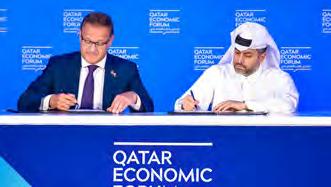
n Bridgestone MEA recently participated in the Mobility Live ME 2024 highlighting its innovative fleet solutions and sustainable practices.
The event, which was held recently at the Abu Dhabi National Exhibition Centre (ADNEC), focused on smart, sustainable transport and electric vehicles, attracting industry leaders to shed light on the global transition towards sustainability mobility.
During its participation, Bridgestone engaged in a thought-provoking panel discussion titled ‘Electrifying Mobility: Accelerating the Transition to Electric Fleets,’ moderated by Umer Khan, Founder, BEV Ready, UAE.
Berk Berksoy represented Bridgestone at the panel discussion as one of its key speakers, along with Claudio Aiardo from Carasti; Anuvrat Gaurav from Sellanycar. com; Sam Cabani from Stellantis; Ib Kimose from Autorola and Mohammed Hamza from Eurostar Rental.
During the panel discussions, Berksoy pointed out the relevance of setting ambitious goals for electrifying fleet operations to reduce carbon emissions and combat climate change challenges.

The panel also explored Total Cost of Ownership (TCO), highlighting the significance of transitioning to electrification. Despite the initial cost involved, this shift can be highly beneficial, leading to long-term savings.
Furthermore, Bridgestone exhibited their innovative fleet optimisation and management solutions such as Webfleet and Toolbox allowing fleets to better manage their tyre operations as well as doing route optimisation, vehicle
scheduling and predictive maintenance that collectively streamline operations and reduce costs. The panel further shed light on the significant role of government incentives and support in expediting the shift towards electric vehicles.
“Our goal is to create a mobility landscape that is more sustainable while ensuring safe and efficient journey for individuals,” explained Jacques Fourie, President, Bridgestone Middle East and Africa.
n DHL Global Forwarding and TotalEnergies have successfully solarized seven of DHL sites in Dubai, marking a new milestone in DHL’s sustainability journey to reduce logisticsrelated emissions to net zero by 2050.
DHL Global Forwarding and TotalEnergies have signed a Power Equipment Lease Agreement (PELA) in 2021 for the solarization of seven sites in Dubai. The move is expected to save around 5,000 tCO2e (tonnes of carbon dioxide equivalent) in the first year—the equivalent of 119,000 trees planted per year.
The 7 MWp solar project will produce over 11,000 MWh per year across DHL sites in JAFZA 1 – 4, DAFZA 39 – 43, DWC AFR and DWC CGF, which will cover 80% of the seven buildings’ energy needs. The solar rooftops are equipped with over 12,000 solar photovoltaic modules, covering a surface equivalent to 27,000 sqm.
In addition, TotalEnergies has equipped
DHL’s sites with solar-powered electric vehicle charging stations, contributing to the Group’s goal of electrifying 60% of its fleet by 2030.
“We are proud to announce that we have reached our target of 100% solarization of seven of our sites in Dubai with our partner TotalEnergies,” commented Amadou Diallo, CEO, DHL Global Forwarding Middle East and Africa.
“We are confident the successful solarization of DHL’s sites will accelerate low carbon logistics in the region,” remarked Hamady Sy, Managing Director, TotalEnergies Renewables Distributed Generation Middle East and Africa.
DHL Global Forwarding has pioneered several low-carbon initiatives in the UAE. In 2022, the company launched a 23,500-sqm EV Hub in Dubai South for batteries to be stored, recycled, repaired, and processed at end of life, ensuring long-term sustainability.













n MYCRANE, the first global platform for online crane rental, is responding to the rapid digital transformation of the Middle East by strengthening its team in the region.
Syed Ahmed Salman has been appointed as VP Sales, Middle East, while Syed Zulnoon Bukhari joins as Director Business Development, Kingdom of Saudi Arabia (KSA). Based in Saudi, the two new hires bring decades of experience to MYCRANE.
“We made a strategic decision to invest in KSA, where the construction market was worth US$148.3bn in 2023 and is expected to record strong growth in the coming years,” stated Andrei Geikalo, MYCRANE founder and CEO.
“The appointment of Salman and Bukhari allows us to go further and faster in the Kingdom, where we see major construction activity in all sectors and almost unlimited potential to grow the platform,” he added.
The platform’s new customer users

include Shibh Al Jazira Contracting, AIC Steel, and Saudi Pan Kingdom Co. (SAPAC) among others. Meanwhile, new crane suppliers joining MYCRANE include Expertise Contracting Co., Integrated Logistic Co., and others, the press note continued.
Salman and Bukhari have a combined 45 years of experience, including extensive exposure to the crane industry
in both the Middle East and the Indian subcontinent.
Salman’s experience in equipment sales and rentals has seen him work on both the east and west coasts of Saudi Arabia, while Bukhari is a logistics and crane rental management professional who has served with leading regional companies including Agility Logistics and Al-Suwaidi Equipment & Transport.
n Al Masaood Commercial Vehicles & Equipment (CV&E), part of renowned Abu Dhabi-based business conglomerate Al Masaood Group, has recently announced that it has secured exclusive distributorship rights for Dongfeng Commercial Vehicles under Dongfeng Automobile Corporation – one of China’s premier automotive manufacturers.
This partnership marks a significant expansion in Al Masaood’s portfolio, introducing a comprehensive range of Dongfeng’s commercial vehicles, including heavy, light, and medium-duty trucks, to the UAE’s market. The collaboration was unveiled at an exciting launch event at the Dubai Autodrome, according to a press statement.
The partnership also extends to the exclusive distributorship of Dongfeng’s DFAC (Dongfeng Automobiles Company Ltd.), which include light duty model ranges, cementing Al Masaood’s position as one of the leading distributors of DFAC light duty trucks, vans and pick up vehicles in the UAE.
This partnership with Dongfeng positions Al Masaood at the forefront of this shift,
offering cutting-edge solutions from one of China’s leading automotive companies.
The introduction of seven new truck models, including two advanced electric vehicles (EVs), marks an expansion for Al Masaood from solely heavy-duty to a more inclusive range that encompasses light and medium-duty trucks.
This broadened offering is set to provide small and medium enterprises (SMEs) and existing clientele with a wider array of vehicles. The versatility and efficiency of these trucks, particularly the electric models,
reflect a significant step towards sustainable transportation solutions, aligning with the UAE’s vision for a greener future.
“Entering into this partnership with premier Chinese brand, Dongfeng, is an extremely exciting and important milestone for us at Al Masaood. Through this cooperation, we hope to offer our customers in the region products and solutions of the highest quality and value to further their operations and the logistics industry,” asserted Hani El Tannir, CEO, Al Masaood Group Industrial.
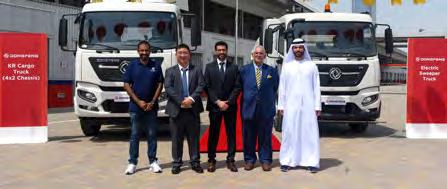
n California, USA headquartered Joby Aviation, a company developing allelectric aircraft for commercial passenger service, recently announced it has signed a multilateral Memorandum of Understanding (MoU) with the Department of Municipalities and Transport-Abu Dhabi (DMT), the Abu Dhabi Department of Economic Development (DED) and the Department of Culture and Tourism-Abu Dhabi (DCT Abu Dhabi) that lays the groundwork for Joby to establish and scale air taxi services in Abu Dhabi and beyond.
The MoU, signed at the DRIFTx international thought-leadership and exhibition platform in Abu Dhabi, demonstrates the breadth of support available to Joby as part of their participation in the Smart and Autonomous Vehicles Industry (SAVI) cluster and builds on Joby’s existing commitments to the UAE, which include the exclusive right to operate air taxi services in Dubai, which the company expects to start as early as next year.
“We look forward to seeing their innovative aircrafts take-off from the UAE capital, offering the world a glimpse, through Abu Dhabi, of what the future of mobility looks like,” observed Mohamed
Ali Al Shorafa, Chairman, DMT.
“Smart and autonomous vehicles are experiencing rapid growth, buoyed by the launch of the SAVI cluster, which leverages Abu Dhabi’s world-class infrastructure to scale the operations of global companies. Joby’s expansion into Abu Dhabi is a testament to the success of this strategy,” commented Ahmed Jasim Al Zaabi, Chairman, ADDED.
“The introduction of scale air taxi services marks a significant addition, enhancing accessibility to natural
attractions, tourist hotspots, and architectural landmarks, thereby elevating overall visitor experiences,” remarked Mohamed Khalifa Al Mubarak, Chairman, DCT Abu Dhabi.
“We’re grateful for the support and collaboration of our governmental partners and the entire ecosystem in Abu Dhabi and we remain deeply impressed by their commitment to building out a world-class aviation ecosystem in the Emirate,” noted JoeBen Bevirt, founder and CEO, Joby Aviation.

n Noatum, a leading multinational provider of integrated port operations, maritime, and logistics services, and an AD Ports Group company, recently announced the inaugural launch of Noatum Maritime’s office in Türkiye.
Launch of the new office, to be led by Noatum Maritime, a core business unit of Noatum, will serve as an important step towards broadening the company’s reach in key regional markets with focus on strengthening its comprehensive maritime agency services in the Mediterranean region.
In addition, Noatum Maritime’s entry into Türkiye’s market is aligned with AD Ports Group’s vision for international expansion and presence across major global markets and trade lanes already connected to, or offering strong prospects to connect to, the UAE.
Led by Ömür Kuyucuoglu, who assumes the role of Country Manager for Noatum
Maritime, the new entity will primarily serve as a port and liner agency, offering a comprehensive suite of maritime services tailored to meet the diverse needs of clients– inclusive of ship owners, ship operators, charterers, and ship managers.
The launch also builds on Noatum’s already extensive local and regional presence and expertise given its existing Noatum Logistics-East Europe, Türkiye & CIS office, which is also based in Istanbul.
“The office will seamlessly integrate into the broader Noatum ecosystem, aiming to deliver integrated maritime agency services better, faster and more cost efficiently, while also attracting new customers in the Türkiye and the East Mediterranean region,” remarked Terry Gidlow, Chief Executive Officer, Noatum Maritime, Noatum, Logistics Cluster, AD Ports Group.
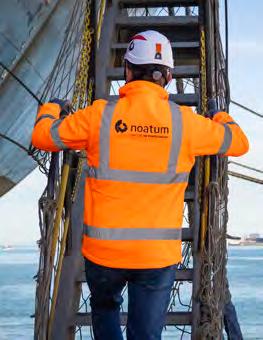
n Qatar Airways and UNHCR, the UN Refugee Agency, recently announced the renewal of their existing partnership to support the shipment of relief items to the most vulnerable refugees and internally displaced people worldwide.
The agreement was signed during a signing ceremony which included a speech by Qatar Airways Group Chief Executive Officer, Engr. Badr Mohammed Al-Meer, and the UN High Commissioner for Refugees, Filippo Grandi, in the presence of the UNHCR’s Representative to the State of Qatar, Ahmed Mohsen, and Qatar Airways, Chief Cargo Officer, Mark Drusch.
Engr. Badr Mohammed Al-Meer announced the two-year renewal of the partnership between Qatar Airways Group and UNHCR to provide humanitarian relief and assistance to those globally displaced.
With this partnership, Qatar Airways will provide another 400 tonnes of free

tonnage to UNHCR to help support them in the delivery of crucial aid supplies to those most in need.
“We look forward to the significant renewal of our partnership and in continuing to aid those who are most vulnerable. Qatar Airways Group is committed to fulfilling its humanitarian role by helping refugees and internally
n Tristar KSA has been lauded by Saudi Basic Industries Corporation (SABIC) for its ‘substantial efforts to deliver the best competitive advantage’ and for supporting the company in reaching their goal of becoming the preferred world leader in chemicals, Tristar revealed in a press communique.
Tristar Group CEO Eugene Mayne and Tristar KSA County Manager Dr. Aous Ali recently attended the 2024 Suppliers Recognition Ceremony at the SABIC headquarters in Jubail, Saudi Arabia, where they received a memento for outstanding performance and significant contributions in 2023.
The event was recognized by SABIC’s Procurement team under Shared Services from among hundreds of suppliers.
Tristar KSA continues to transport liquid gases from SABIC’s plants in Jubail in the East Province and Yanbu in the Western Province to various SABIC affiliates across Saudi Arabia and the Gulf Cooperating Council (GCC) states, and to Jordan.
Products transported by Tristar for SABIC include chemicals such as MTBE (methyl tertiary-butyl ether), caustic soda, styrene, and various chemicals.
Tristar’s fleet of gas-carrying road tankers and cryogenic ISO tankers comply with all SABIC requirements and various national and international regulations, the press statement concluded.
displaced people worldwide,” stated Engr Al-Meer.
By working with Qatar Airways, UNHCR has wide access to deliver lifesaving support including water, medical care and hygiene materials to keep refugees, internally displaced people, and host community members safe around the world, a press statement concluded.



International Benefits:
+ The FIATA member certificate
+ Use of the Fiata logo
+ Entry in the FIATA members directory & networking events



+ Advertising in the FIATA members directory, review and information (FIATA e-Flash)
+ Special Rates for FIATA publication and articles
+ Access to secretariat›s assistance
+ FIATA arbitration code
+ Use of FIATA documents
+ FIATA worldwide member connectivity
+ Talent Connect Worldwide, E-Learning


+ Discountes rates in participating in global and regional conferences
+ Asssistance in case of legal advocacy
+ Discounts for cargo/logistic events and exhibition stands
+ Discount training for NAFL members
+ Training/Certification for regional/international courses
+ Insurance at discounted rates (cargo/liability/medical)
+ Complimentary internship, Skill upgrade and Mentoring & Innovation ideas
+ Discounted supplier rates for industry products
n Yango, a global tech company, showcased its latest solutions for business process optimization at Seamless 2024 in Dubai. The event featured autonomous last-mile delivery robots, a comprehensive tech stack for e-grocery businesses, and the debut of Yango’s robotic pick-and-place platform and other solutions to streamline warehouse automation.
All these products are designed to enhance operational efficiency and provide Middle East businesses with a competitive edge, the company said in a press communique.
Having made their regional debut earlier this year, Yango’s autonomous delivery robots offer several benefits to businesses. These innovative vehicles deliver food and packages in cities, automate routine processes, and execute deliveries in restricted areas with limited access to outsiders. They also offer advanced navigation for quicker routes and reduced delivery times.
The robots perform well in various weather conditions and terrains, ensuring safe and secure package delivery. Moreover, they support sustainable operations by using
clean energy and lowering carbon emissions, which aligns with the GCC’s commitment to environmental sustainability.
“We are excited to present our autonomous delivery robots at Seamless Middle East 2024. We believe that our delivery solutions have the potential to transform the industry and serve the diverse needs of businesses and consumers in the GCC region. At the moment, we are actively seeking partnerships to bring our products to the vibrant cities of the Middle East,” asserted Nikita Gavrilov, Regional Head of Autonomous Delivery Solutions, Middle East, Yango.
For the first time, Yango will demonstrate its AI-driven robotic pick-and-place platform and other solutions for warehousing and logistics challenging rising fulfillment costs. The platform is designed to improve warehouse efficiency by leveraging computer vision, enabling any off the shelf stationary robot to operate with humanlike capabilities. It accurately navigates warehouse environments, makes optimal decisions in real time, and helps reduce costs; the press statement concluded.

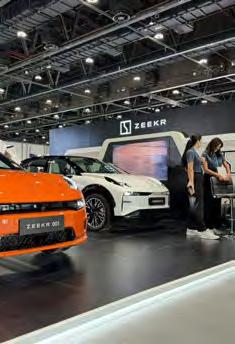
n AW Rostamani Group (AWR) announced its sponsorship and active participation of the recently concluded three-day Electric Vehicle Innovation Summit (EVIS) held from 20 to 22 May 2024 in Abu Dhabi.
The summit showcased AWR’s commitment to the future of mobility through its premium electric vehicle brand, Zeekr, newly introduced in the UAE to cater to the rising demand for EVs in the country.
AWR’s participation aligns with the UAE’s ambitious EV goals and its dedication to sustainable mobility. At the summit, Roberto Colucci, Director, Zeekr UAE, AW Rostamani Group, contributed to a panel discussion titled ‘Roadmap to Electrification – Insights into the Middle East EV Market.’ The panel explored challenges, solutions, and best practices for successful EV market development in the region.
“With the nation increasingly placing its focus on sustainable mobility and a greener future, Zeekr is passionate about pushing the boundaries of EV innovation. EVIS provided us with a valuable platform to engage with industry experts, address challenges, and collaborate on solutions that will contribute to the growth of the EV industry,” stated Colucci.
The summit provided a unique opportunity for Zeekr to showcase its innovative EV solutions and contribute to the UAE’s vision for a greener future. Throughout the three-day event, Zeekr exhibited its two models, the 001 and the X.
EVIS, supported by the Ministry of Energy and Infrastructure, and played a significant role in advancing the EV industry. The summit provided an opportunity for companies to showcase their innovative e-vehicle models and sustainable solutions, while also offering participants a chance to witness the latest developments in the EV sector at The Tech Park, a press statement concluded.
n FedEx is on a roll in the Kingdom and participates in the annual ‘Made in Saudi’ Exhibition held in the Kingdom’s capital.
“The World Bank’s upward revisions of GDP forecasts to 4.1% for the UAE and 5.9% for Saudi Arabia in 2025 reflect the resilience and potential of these dynamic economies. These revisions are driven by the growth in the non-oil sector, which is a result of the nations’ diversification efforts and reforms,” according to Taarek Hinedi, Vice President, FedEx Express Middle East and Africa Operations.
“The UAE’s record-high nonoil economic growth, reaching AED 3.5trillion in 2023, demonstrates the country’s increased demand for efficient, reliable, and smart logistics solutions to support the flow of goods and services,” affirmed Hinedi.
“Our recent developments in the
Middle East region, including the establishment of our new regional air and ground hub at DWC, enhancements to FedEx International Priority Service transit times, and launch of cost effective FedEx Less-than-Container Load Priority ocean-road and Regional Economy services, support the diverse trade requirements of different industries,” he asserted Hinedi.
In Saudi Arabia, FedEx has also been collaborating with the Saudi Export Development Authority, represented by the “Made in Saudi” program, offering customized logistics solutions to the authority’s members and enhancing their access to global markets. These efforts align with the Kingdom’s Vision 2030, aiming to increase non-oil exports in non-oil GDP to 50%.
“By facilitating world trade, enabling


Taarek Hinedi, Vice President, FedEx Express Middle East and Africa Operations
global connectivity, and implementing technology-led solutions, logistics plays a crucial role in the socio-economic development and GDP growth across the region,” concluded Hinedi.
n The Gulf Petrochemicals and Chemicals Association (GPCA) recently announced the winners of the 5th GPCA Supply Chain Excellence Awards, which took place in a star-studded award ceremony during the 15th GPCA Supply Chain Conference in Dubai, UAE.
The Awards were open to all regional chemical supply chain and logistics operators and providers, who have developed and integrated innovative and sustainable solutions in their operations.
The winners in each category received a trophy of recognition as well as a certificate during the award ceremony.
The winners and finalists at this year’s Awards were:
Category 1: Supply Chain Innovation Award
The winner in this category TASNEE impressed the jury with their Procurement function’s Robotic Process Automation, which not only enhanced operational efficiency, but it also fostered supplier diversity, and maximized the strategic use of agreements.

Category 2: Best Logistics Service Provider (LSP) of the Year
PSA BDP scooped Best LSP of the Year at the 5th GPCA Supply Chain Excellence Awards for demonstrating agility and excellence and providing efficient service and reduced risk and delays.
Category 3: Excellence in Sustainability Award
QAFCO beat the competition in this highly coveted category and won the Excellence in Sustainability Award for their Environmental Management System, which ensures minimized environmental impact of QAFCO’s fertilizer production.
Category 4: Women in Supply Chain Award
The winner in this category is Fatma Al Kaabi, Team Lead Plastics & NGLE, OQ for implementing innovative supply chain strategies and cost-cutting initiatives, which made significant contributions to OQ and the broader industry.
“Congratulations to all winners and finalists at this year’s GPCA Supply Chain Excellence Awards on their ingenuity, commitment to excellence and dedication to advancing the supply chain function in the GCC,” commented Dr. Abdulwahab Al-Sadoun, Secretary General, GPCA.
n Emirates Glass, one of the leading processors of architectural flat glass in the Middle East and a wholly owned subsidiary of Dubai Investments, has taken another technological leap with the acquisition of Tecglass’s Vitro-Jet FS Jumbo digital printing production line.
This strategic investment underscores Emirates Glass’s steady commitment to innovation and excellence, propelling the company into a new era of digital printed glass production.
The Vitro-Jet FS Jumbo, an advanced digital printing solution tailored for large-scale glass sheets, positions Emirates Glass as a catalyst in the digital transformation of glass manufacturing. This innovative technology empowers Emirates Glass to reproduce intricate graphic designs in the most varied sizes at unprecedented speeds, significantly reducing production time while enhancing flexibility and efficiency.
“This cutting-edge technology empowers us to deliver innovative,
customized glass solutions on a scale never seen before. It perfectly aligns with the Company’s commitment to pushing the boundaries of what’s possible in the glass industry,” stated Rizwanulla Khan, Executive President, Emirates Glass.
This state-of-the-art digital printing production line can deliver highresolution, vibrant prints on jumbosized glass sheets. This technological breakthrough expands the company’s
capacity to produce fully customized glass panels for architectural and interior applications, offering unparalleled design flexibility to meet the diverse aesthetic preferences of the industry.
The Vitro-Jet FS Jumbo’s exclusive Fast Frame Printing Tool revolutionizes installations, making it ideal for a wide range of applications including IG Units, frameless windows, and solar panels, a press communique concluded.

n Fine Hygienic Holding (FHH), a global hygiene industry leader, has announced its Al Nakheel paper manufacturing plant has been awarded the EcoVadis Silver Rating.
The prestigious recognition underlines FFH’s position among the top 20 per cent of companies globally in terms of sustainability practices and showcases its leading role in environmental and corporate social responsibility, according to a press communique.
This EcoVadis Silver Rating for Al Nakheel Hygienic Paper Manufacturing, a key part of FHH, highlights the company’s commitment to setting new standards in sustainable manufacturing practices in the hygiene industry both regionally and globally.
FHH embarked on an extensive sustainability performance evaluation in recent times, encompassing a wide range of critical themes, including environmental responsibility, labour and human rights, ethical business practices, and sustainable procurement strategies, the press statement continued.
“This achievement is testament to our
commitment to sustainability and our pursuit of excellence in all aspects of our operations. It reaffirms our dedication to being a leading sustainable enterprise,” remarked James Michael Lafferty, CEO, Fine Hygienic Holding.
EcoVadis provides the leading solution for monitoring sustainability in global supply chains. Using innovative technology and sustainability expertise, it strives to engage companies and helps them adopt sustainable practices.
“FHH’s journey towards sustainability is a core aspect of its business philosophy, which aims to set new hygiene industry benchmarks. The EcoVadis recognition is a result of the collective effort of the dedicated team at FHH and the unwavering support of its customers and partners,” Lafferty added.


